#gu wei yi
Text
Series: Put Your Head On My Shoulder
What better way to spend being sick is by bingewatching some dramas? I watched the chinese Put Your Head On My Shoulder and was honestly addicted to it. This cute drama is a quirky remake of a novel by #ZhaoQianqian and was also remade in Thailand in 2021 #chinesedrama #romcom #review
While I was sick during the pandemic I turned to Netflix and decided to watch a whole bunch of dramas, one of the one that truly stood out to me was the Chinese drama Put Your Head On My Shoulder; based on Zhao Qianqian’s novel of the same name. With actress Xing Fei playing the lead role as accounting (but I think it was more graphic/commercial) student who moves out of the dorm room at school…

View On WordPress
#coming-of-age#fupei#Gu Wei Yi#Lin Yi#Put Your Head on My Shoulder#romantic comedy#romcom#Si Tu Mo#slice of life#Tang Xiaotian#Xing Fei#Zhi wo men nuan nuan de xiao shi guang#致我们暖暖的小时光
0 notes
Text
I wish I loved "Put Your Head On My Shoulder" more. It has a strong start, but I had to force myself through the last 6-8 episodes. It jsut felt like not much was going on, which is okay with me if I feel like that time is used for character and relationship development. And it was a bit, but mostly I didn't feel by episode 24 (the finale) that the main couple was even ready to get married. I wish they would have dated longer or the show at least showed them getting past the initial awkwardness of dating at some point. But the physical intimacy still looked cold by the last ep.
I liked the concept and the characters though. Si Tu Mo is so cute, I'll definitely have to look into her actress. Mo Mo and Gu Wei Yi together was also fun to watch though there were some immature moments here and there, which actually fit their age so I didn't mind.
Shan Shan? Also cute! Her character and Fu Pei's, and then them together were really interesting to me. I like that Fu Pei wasn't cut slack for stringing Mo Mo along, and I also like that Shan Shan wasn't really cut slack for her self-sacrifices. Their relationship is... idk how to describe it but it's so clearly built on red flags and enabling, and the show chose to not really sugarcoat that, which made it interesting to see what the writers were trying to tell us.
1 note
·
View note
Text
So I'm just gonna make a new post about it. I have a server for danmei fans on discord and I'm trying to get it active again because i failed the first time. So if you feel like joining then don't hesitate!! Here is the link:
#JUST REBLOG THIS CUZ I CANT WITH EM TAGS LMAO#jk dont force ya self#danmei novels#danmei#danmei server#mxtx#priest#meatbun doesn't eat meat#sha po lang#gu yun#chang geng#shen yi#mdzs#wei wuxian#lan wangji#jiang yanli#jiang cheng#wangxian#svsss#shen qingqiu#shang qinghua#lou binghe#bingqiu#tgcf#hualian#xie lian#hua chengzhu
14 notes
·
View notes
Video
youtube
Full Version | A girl disguised as a man in college finds true love | [G...
Cdrama: Guyuan Imperial College (2022)
Watch this video on Youtube: https://www.youtube.com/watch?v=4TBdtnVOm6g
#youtube#Guyuan Imperial College#谷远山上有书院#Gu Yuan Shan Shang You Shu Yuan#谷遠山上有書院#2022#WeTV#Tencent#cdrama#chinese drama#Short Length Series#Web Serie#Full version#Free full version#Ryan Cheng#Cheng Lei#Wang Ya Jia#Chen Huan#Wang Yi Dan#Wu Bo Wei#Li Zi Tian#Canti Lau#Liu Xi Ming
2 notes
·
View notes
Text
In support of Hot General Summer (tm)
I realized that my recent poll not only lacked visual support but also left out a lot of my fave cdrama generals. So, in support of my Hot General Summer agenda:
Xiao Qi, Rebel Princess

Wei Wu Ji, Sound of the Desert
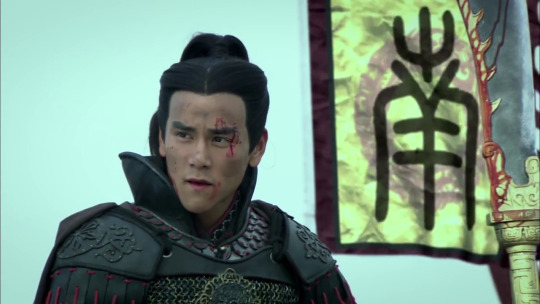
Ling Buyi, Love Like the Galaxy

Zhousheng Chen, One and Only

Zhao Yun, God of War Zhao Yun
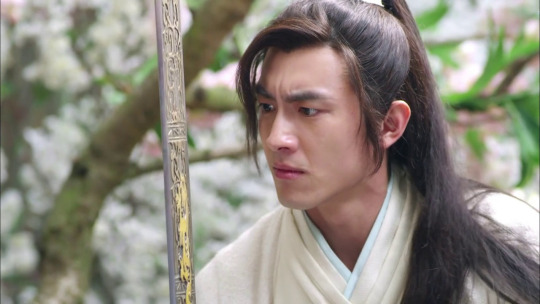
Sima Yi, Secret of Three Kingdoms
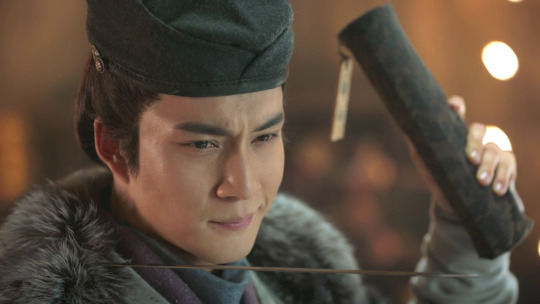
Han De Rang, The Legend of Xiao Chuo

Zhan Beiye, Legend of Fuyao

Gao Chang Gong, Lan Ling Wang

Xiang Yu, Story of Han Dynasty

Cao Pi, The Advisors’ Alliance

Meng Tiang Fang, Ancient Terracotta War Situation
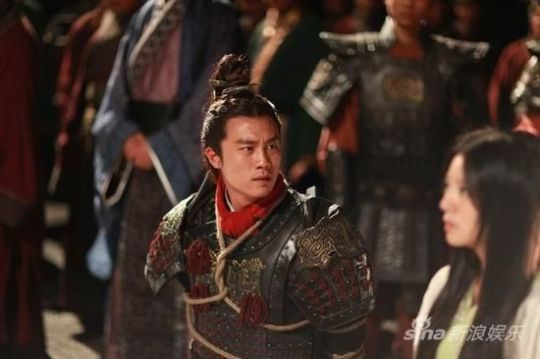
Chu Bei Jie, General and I
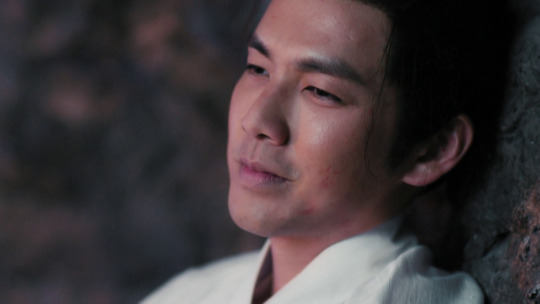
Zhu Zan, Jin Jiu Ling

Wolfie, The Wolf
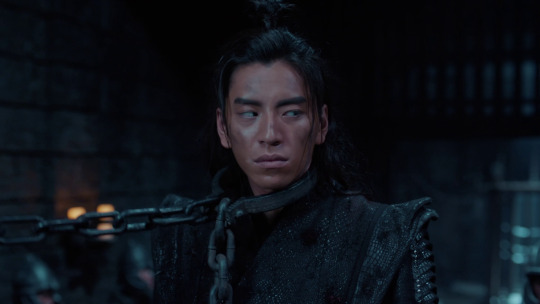
Xiang Yu, Legend of Chu and Han

Cheng Yi, The Promise of Chang’an

Liu Xiu, Singing All Along
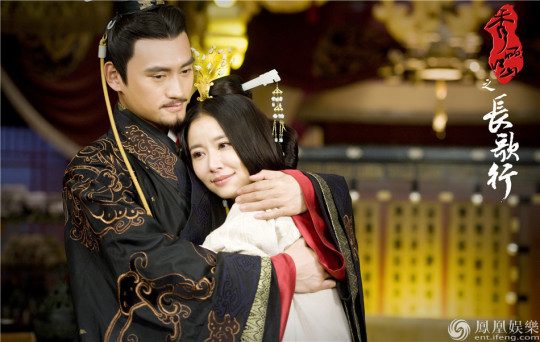
Huo Xin, Painted Skin the Resurrection
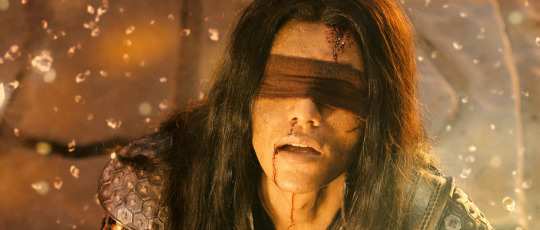
Meng Qi You, Glamorous Imperial Concubine

Yang Bros, The Young Warriors

Weng Gui, Princess Jieyou

Xiao Ping Zhang, Nirvana in Fire 2
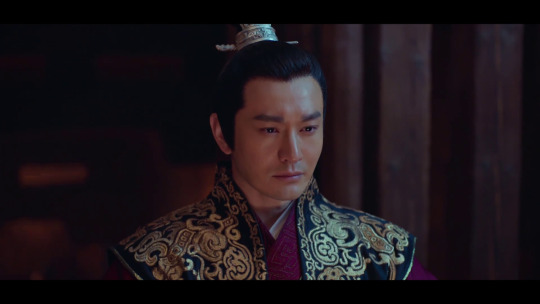
Pei Zhao, Maiden Holmes
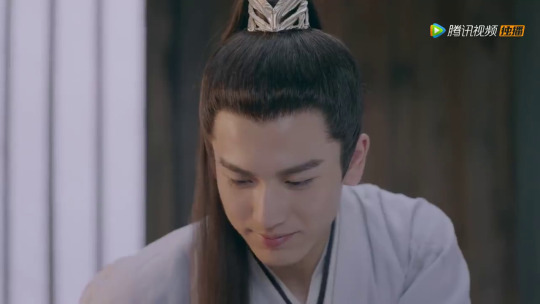
Ji Ye, Novoland Eagle Flag
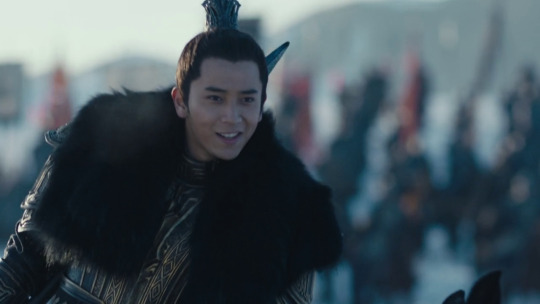
Zhu Qi Zhen, Imperial Doctress (it’s a reach he’s an emperor. But he leads his force in battle and I wanted Wallace Huo there so...)

Yuan Ling, Lost Love in Times

Yi Xiao Chuan, The Myth

Gu Tingye, The Story of Ming Lan
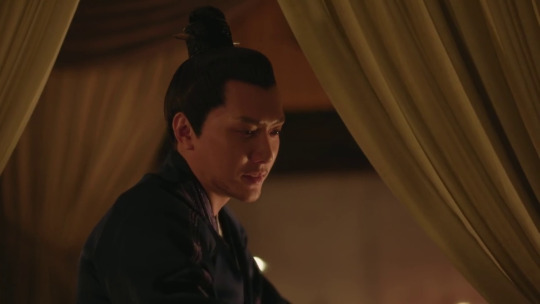
Lu Bu, Three Kingdoms 2010
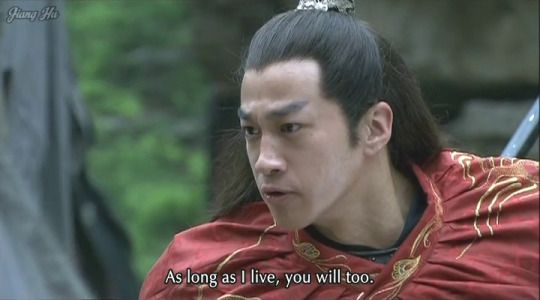
Xu Lingyi, The Sword and the Brocade
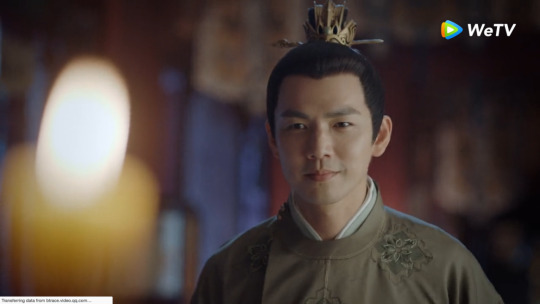
Yue Fei, Patriot Yue Fei
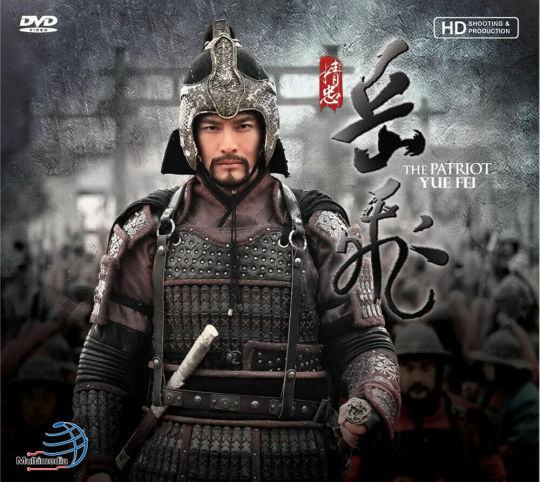
Xiang Yu, The Myth

Ping Zhang, Nirvana in Fire 2

Guo Jing, Legend of Condor Heroes 2008

Xiang Yu, The Legend of Qin
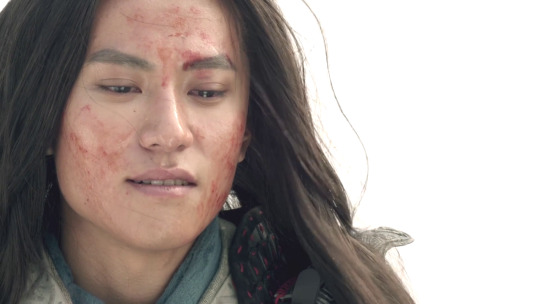
#cdrama#the myth#the legend of qin#nirvana in fire 2#three kingdoms 2010#the story of ming lan#the sword and the brocade#singing all along#patriot yue fei#princess jieyou#general and i#legend of condor heroes#the story of han dynasty#the legend of xiao chuo#novoland eagle flag#ancient terracotta war situation#fight and love with a terracotta warrior#one and only#lan ling wang#legend of chu and han#the wolf#the promise of chang'an#god of war zhao yun#painted skin resurrection#lost love in times#the imperial doctress#glamorous imperial concubine#rebel princess#monarch industry#maiden holmes
140 notes
·
View notes
Text
People keep claiming Chinese BL manhua really only have stories featuring toxic male leads, so I offered to give recommendations with green flags... Someone finally said yes, so here's what I typed up in response!:
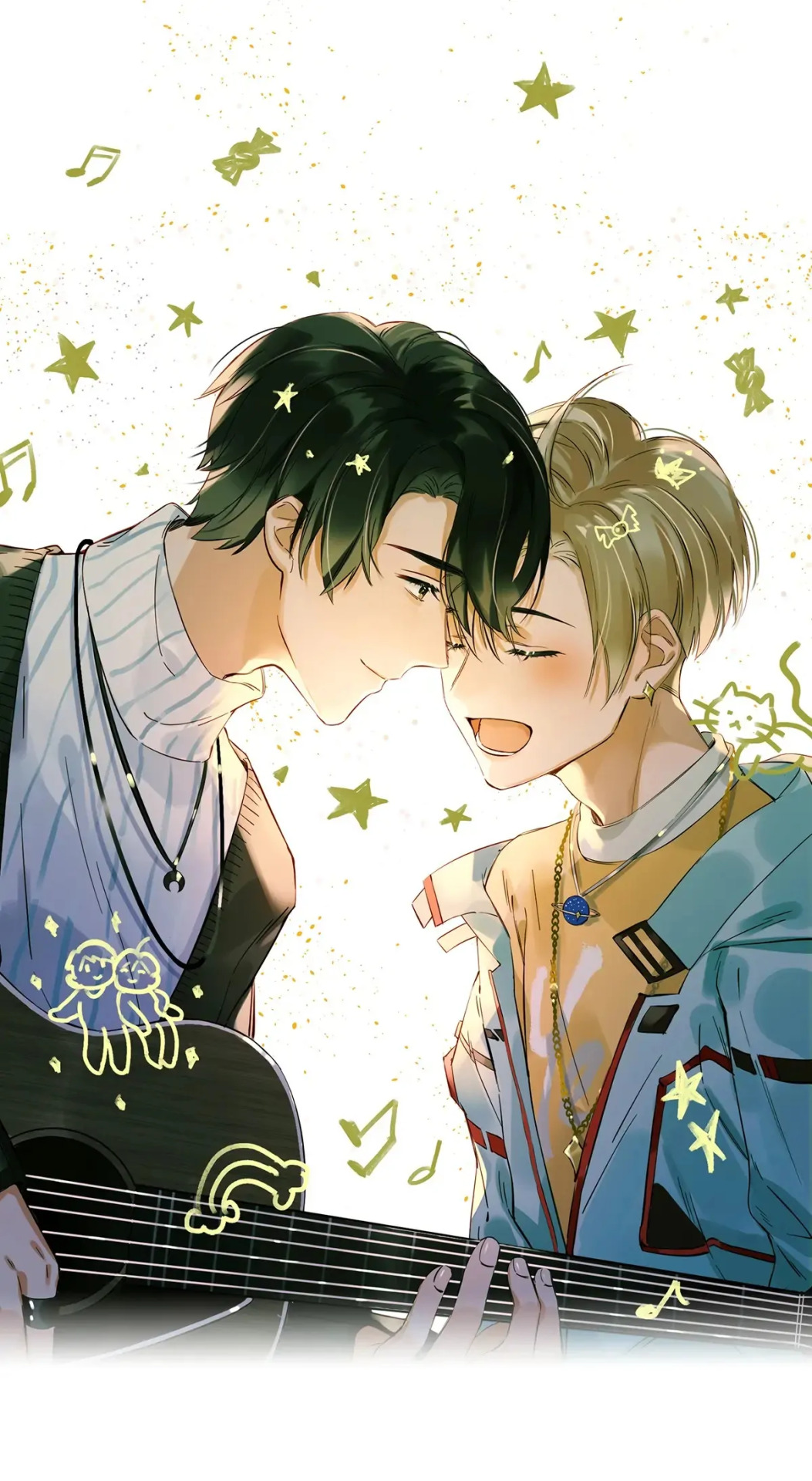
I Ship My Rival x Me:
One of my personal favourites!
Based on the hilarious novel, commonly known as I Ship My Adversary x Me and also has an audio drama adaptation on MaoEr FM. Basically a story about two actors who are seen as complete rivals by everyone except the actors themselves, which annoys the main character (Wei Yanzi) enough that when he discovers there are actual fans who ship them instead of pit them against one another, he’s so excited he sort of starts shipping them too (in like, an abstract, theoretical manner lmao). This of course causes shenanigans as he actually gets to know the person who people ship him with/pit him against, Gu Yiliang.
Gu Yiliang is a true sweetheart and the greenest of green flags. He’s a complete puppy and I love him. And this means, naturally, the only misunderstandings in this story are of the hilarious kind (you’ll know what I mean if you read it lol). 😂
This one actually used to be available officially in English on the Bilibili manhua’s international app before it got shut down, but it recently got picked up by Seven Seas, the company behind a lot of official English translations of danmei (Chinese BL)!
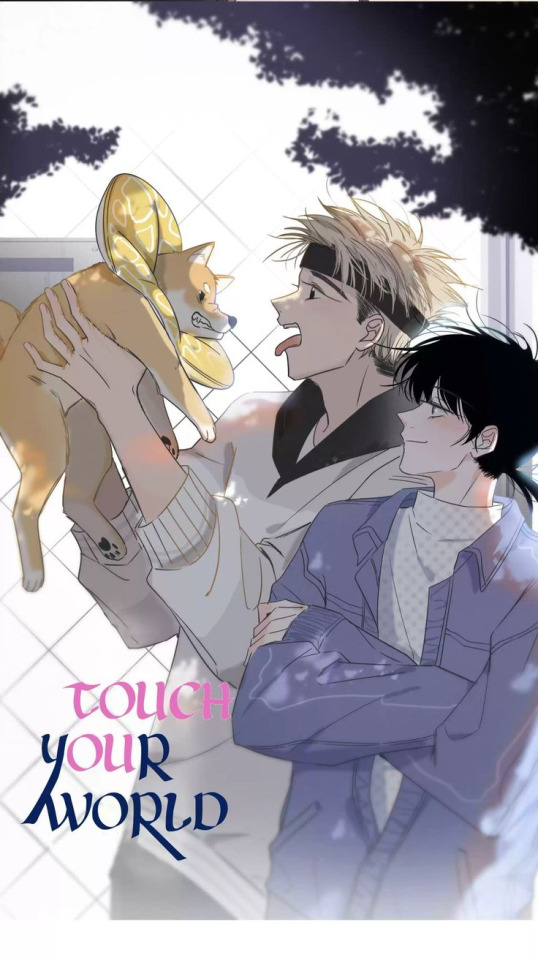
Touch Your World:
A literally colour-blind boy (as in, he cannot see colour at all and only sees things in black and white) discovers someone who he can see colour on. This person is a designer who has suffered past betrayal and trauma that has caused him to shut himself up and grow much more on edge, but this chance meeting draws both parties out of their shells.
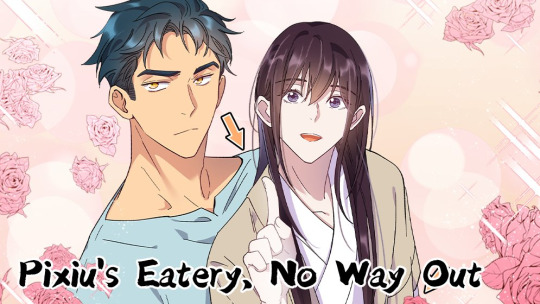
Pixiu’s Eatery, No Way Out:
Not a green flag top in the traditional sense, but here we meet the mythical Pixiu: an ancient Chinese mythical creature who now runs a restaurant. While he’s a penny-pincher with a temper and he doesn’t get along with his love interest at first (a ghost named Wen Xi who he finds suspicious due to Wen Xi’s ties to a past rival of his named Taotie), Pixiu and Wen Xi eventually grow, quite naturally—and hilariously!—into a found family.
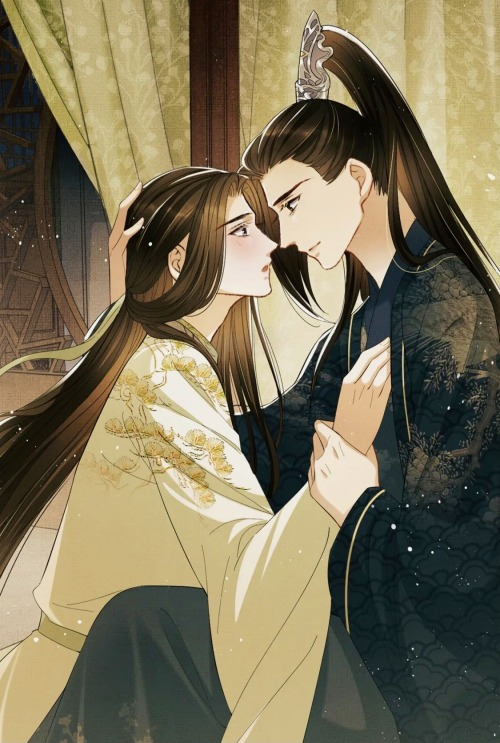
The Wife Is First:
Based on a novel of pretty much the same name (and is written by the same author as the popular manhua and donghua, No Doubt in Us (a heterosexual body-swap romance, which also has a subtle gay side ship)). Here we meet Jing Shao just as he’s about to lose everything: once a royal and a powerful general, he has been betrayed by all those around him…except the husband he has never treated well.
As such, when we first meet him, we actually witness his—and his husband’s—deaths. But then he awakens and finds himself back in time to the night right after he was forced to wed this husband of his, and Jing Shao vows to treat him well from now on because he stuck with him through thick and thin despite everything.
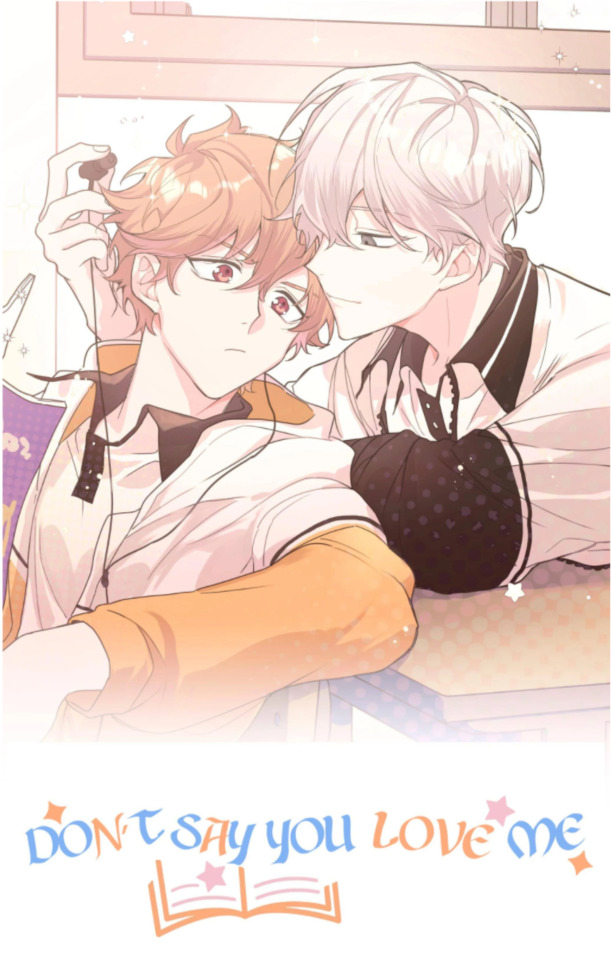
Don’t Say You Love Me:
A high school romance with a supernatural twist: Lin Yutong was confessed to by his best friend, Qin Weiyun, at their graduation party. When he drunkenly freaked out and ran away, Qin Weiyun was hit by a car during the chase…
Devastated by his loss, Lin Yutong quickly wakes up to find himself back at the start of his high school journey, right before he meets Qin Weiyun… And this time, he wants to keep Qin Weiyun safe.
But his overly familiar attitude at first gets the wary Qin Weiyun a tad suspicious, because he’s actually quite an aloof person.
The author and artist of this one is also behind another popular manhua titled Your Dream Is Delicious, which is about a demon named Yi Kui who discovers he enjoys eating the nightmares of Lin You. This eventually leads to them—you guessed it—falling in love.
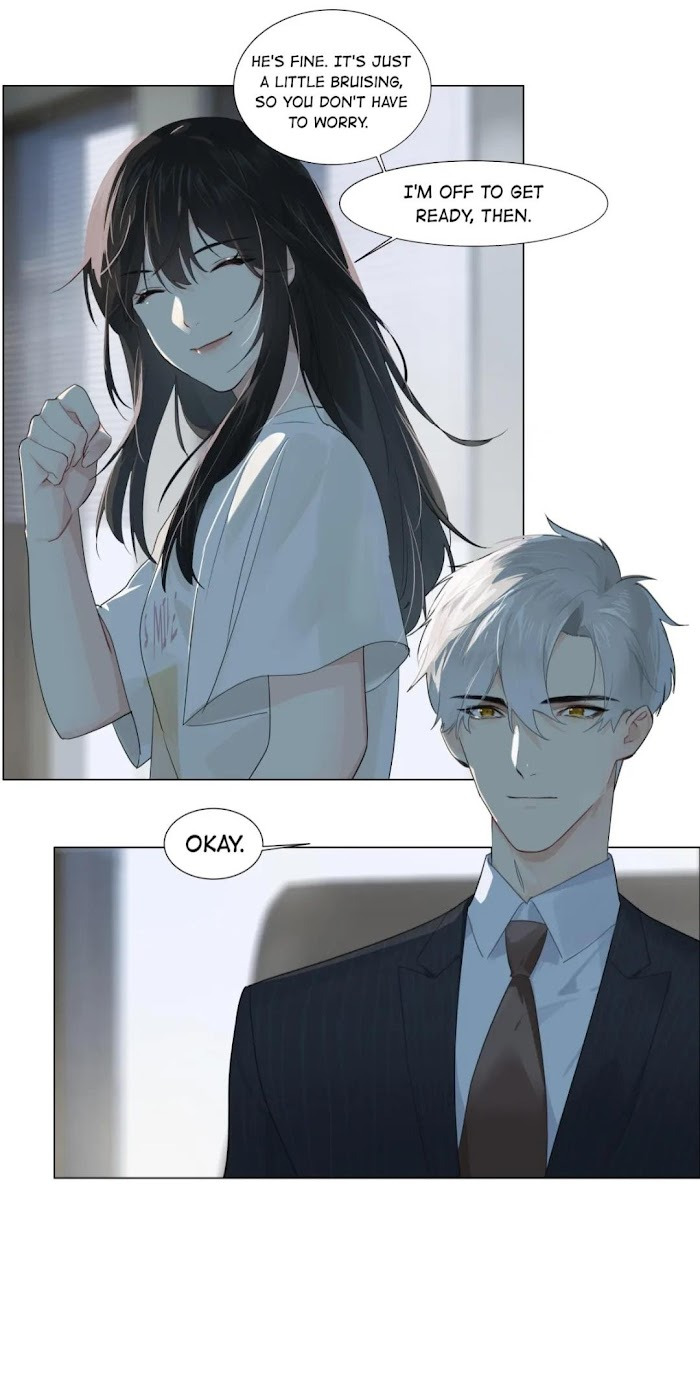
It’s Not That I Want to Wear Women’s Clothing:
Our main character is hired to crossdress to help this CEO get over his gynophobia (fear of touching women) without him knowing. Naturally, this leads to an awkward romantic journey of both identities of our main character getting close to this CEO…who at first glance seems like the typical cold and aloof CEO type, except he’s actually quite a sweetheart.
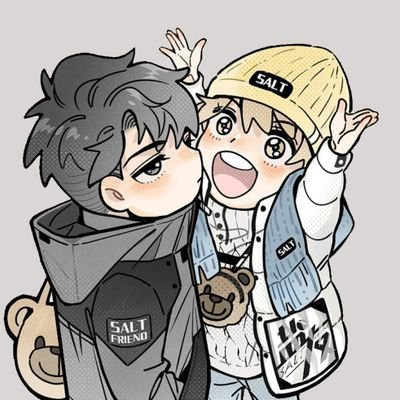
Salt Friend:
A slice-of-life high school story about the “school bully” named Tong Yang who’s actually a crybaby and the aloof person named Xiao Zhen who discovers him crying. While the two don’t seem like they’d get along at first glance, this quickly becomes a friends-to-lovers story that navigates family drama alongside the romance.
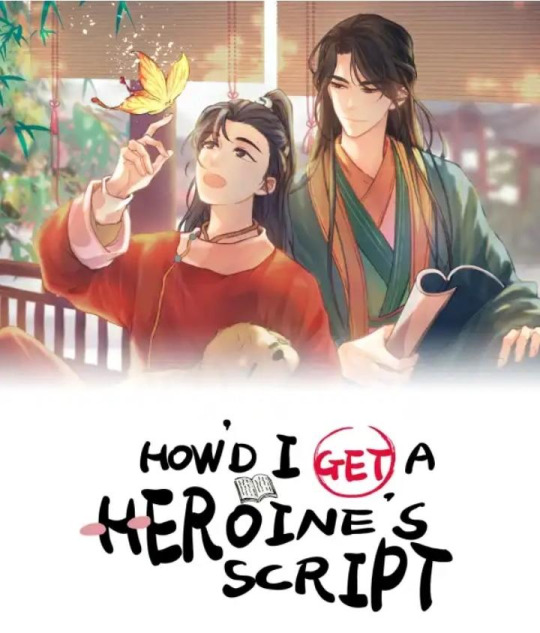
How’d I Get a Heroine’s Script?:
A transmigration story with a twist. Chao Yi is wheelchair-bound but finds himself eventually as a young lord in what is basically a palace drama (court politics, intrigue, family drama, all that good stuff). His System, Qin Que, tasks him with wooing the difficult 7th prince, Gu Yunheng, who smiles on the surface but is quite cold in actuality.
Despite the two getting off on the wrong foot—mostly because Gu Yunheng is really hard to get close to—they soon end up as unlikely allies…especially since there’s a lot of secrets, such as regarding the death of the body Chao Yi’s occupying, the scheming princes, and even Gu Yunheng himself.

See You My King:
Zhang Li, a student interested in what is basically ancient Egypt, goes on an expedition to the ruined civilization and nearly loses his life. Except at the same time, he discovers an ancient tomb with a statue that actually comes to life and saves him…
And this statue even follows him home. This statue is sweet and loving despite its inability to speak, and Zhang Li grows attached to it (or him)… But then the statue falls apart and Zhang Li is devastated.
In wishing for a miracle to bring them back together, the statue’s stone heart sends Zhang Li back in time…to when this ancient civilization is still present. And that’s how he discovers his stone statue is the “tyrant king” of this region, and as cruel as he seems at first glance, both this king and Zhang Li eventually grow close and unfold the different sides to one another that makes them inseparable in the face of all kinds of threats.
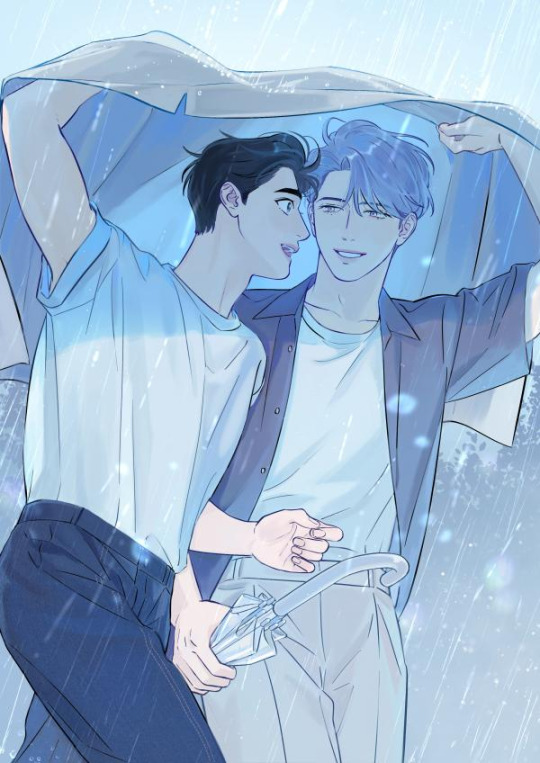
Trapping the Foxy Doctor:
A doctor and a psychiatrist meet…except it doesn’t seem like a perfect love story at first glance. Not because the doctor is traditionally foxy (seductive and/or cunning), but because he’s so silly and on-the-nose that he initially kind of rubs the psychiatrist the wrong way. Except, of course, with the kind of sunny sincerity displayed by our doctor Zhi Banyi, you can’t resist him for long…
And the psychiatrist, Lin Li, is himself quite a polite soul despite his complex upbringing. As such, the two end up together through a series of cases where they have to collaborate and help clients, with a lot of shenanigans sprinkled in between (including the fact Lin Li has a side-job live-streaming as a woman—and “she” just so happens to be Zhi Banyi’s favourite streamer lol).

Pirouette Into My Heart aka Salad Days:
You know the “he was a skater boy and she did ballet” kind of set-up? Well here we have a boxer and a ballet dancer…and hey, “can I make it any more obvious”?
This one is basically a feel-good story of the century. It’s childhood friends to lovers, and it’s soft and cuddly and encouraging, as we follow the main character, Jiang Shen, in achieving his ballet dreams. And on every step of the way, he’s accompanied by the boxer Bai Jinyi, who’s also chasing his own dreams.
The draw of this one is that while there’s obviously conflict to drive the plot along, it’s ultimately a comforting story, so you get all warm and squishy inside reading it. Bai Jinyi and Jiang Shen are very supportive of one another, as is everyone around them.
There’s even extras at the very end that swap the classes of the two main characters, which makes for a similarly compelling AU. 🤭
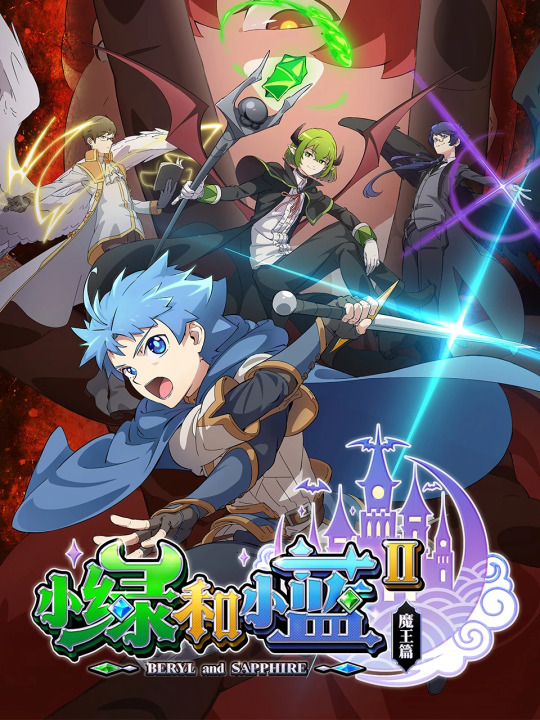
Beryl and Sapphire:
Not always BL but often is. What do I mean by that? Well it’s a story that can switch to any universe even as the characters stay the same, and some worlds are just one-off gags while some are whole story arcs. The original manhua features stick figures, so if you really want to experience this one, I’d recommend the donghua. The first season also cleverly shows the main characters as actors in the OP, which explains all the world-switching pretty easily haha.

Don’t Pick Up Boyfriends from the Trash Bin:
Unfortunately I’m not sure the manhua for this one is still ongoing, but the original novel (all about transmigration and hopping multiple worlds) 100% features a green flag top.

The Guy Inside Me:
I know the title sounds sexual lol but it’s actually a joke about how it’s a body-swap story. 😆
The original Chinese title is “This Question Is Too Difficult”) and of course, the author also wrote Fake Slackers, which has two very smart students act like terrible ones due to not wanting trouble.
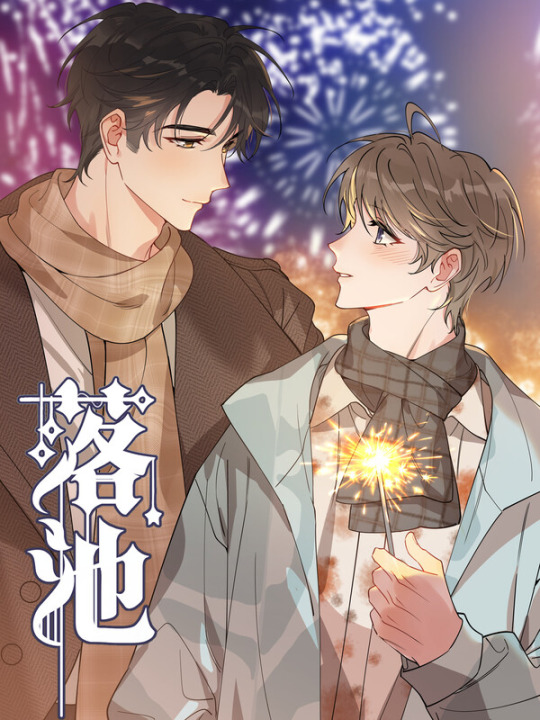
Falling to Where I Belong:
The thing about this one is that the top is 100% a total green flag... It's the main character that's more of a red flag, in the sense he at first only asks the top out to humiliate him due to a misunderstanding.
But it's still a heartfelt story filled with regret and growth, and I did really like the portrayal of Cheng Feichi. Personally I think the manhua humanizes him a bit more than the novel since we didn't really get his POV in the novel that often, but I did hope for even more emotion in the ending... Still, it was a satisfying read, and while I would like to comfort the main character, Zhen Yeming, over his regrets, I really want to just give all the good things to Cheng Feichi, who definitely deserves it after everything he went through.
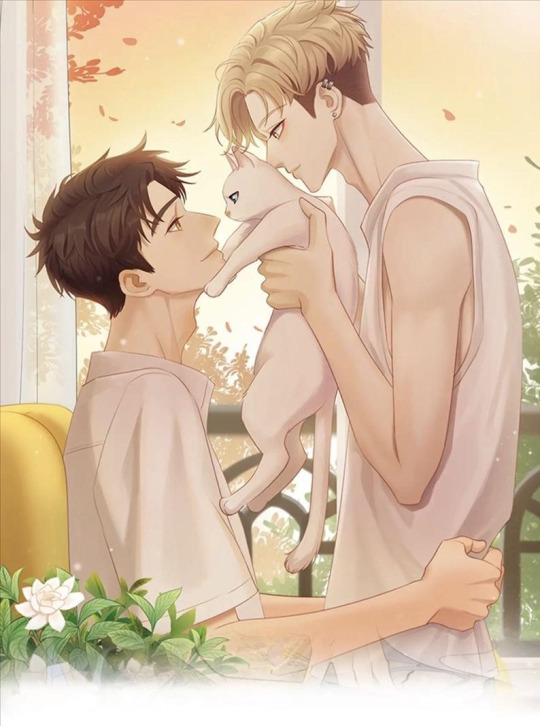
More Than Brothers:
For the "non-freaks" out there, they're not actual brothers, don’t worry; not adopted brothers either. Just a guy who saw his younger friend as his bro…until this friend disappeared from his life and apparently got into a bad crowd… Except in reality he is being harassed and is struggling to leave his abusive family.

The Protagonist Just Wants to Fall in Love:
Kind of a classic in the transmigration genre, except now we get multiple worlds in multiple arcs. Our protagonists are Systems on their final mission, aiming to become human by the end of it, and their task is to guide their protagonists away from the path of "darkening" (essentially corruption).
And each and every one of these systems do so by getting their protagonist to fall in love with them lol.
Unsurprisingly, my favourite arc so far—in the manhua at least!—is the historical one between the advisor and the emperor, but the third—and currently ongoing as the time of me writing this—world between two university students who started getting close during military training and by playing games is also quite cute.
And okay, man I could really keep going, especially with the manhua that are based on novels, but this post is already really long asjakfl. It was, in fact, so fucking long YouTube wouldn't even let me post it at first until I cut it down AMFKGSJDFGS.
But I still want to at least give a shout out to some of the manhua with pretty healthy, green flag tops/gongs!:
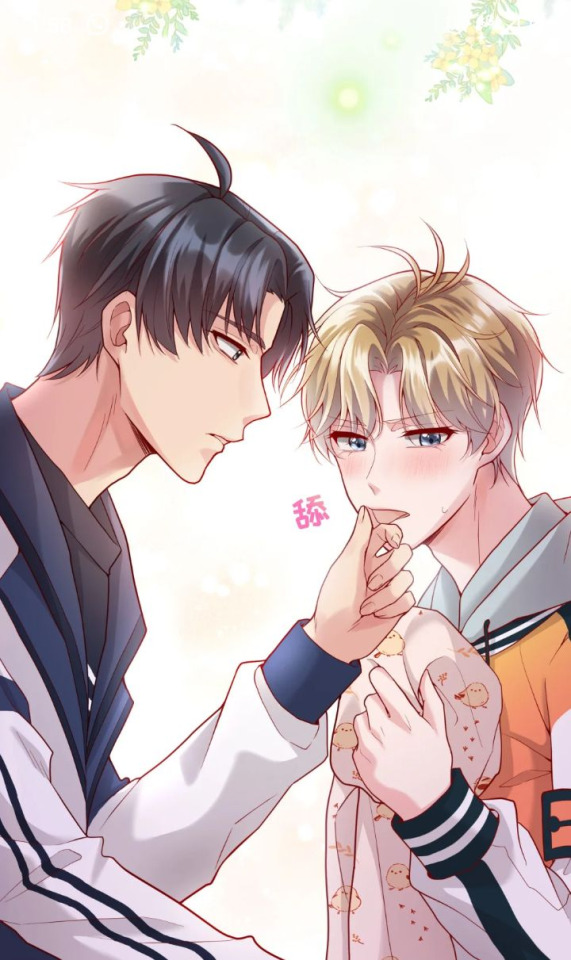
Like Han Yuan, despite the characters not getting along at first and Yu Han being rather aloof to the spoiled Luo Linyuan, is still quite sweet at its core. Lovely Allergen is as well, even with their "brotherly" relationship being the forefront of the conflict between Song Yu and Yue Zishi.
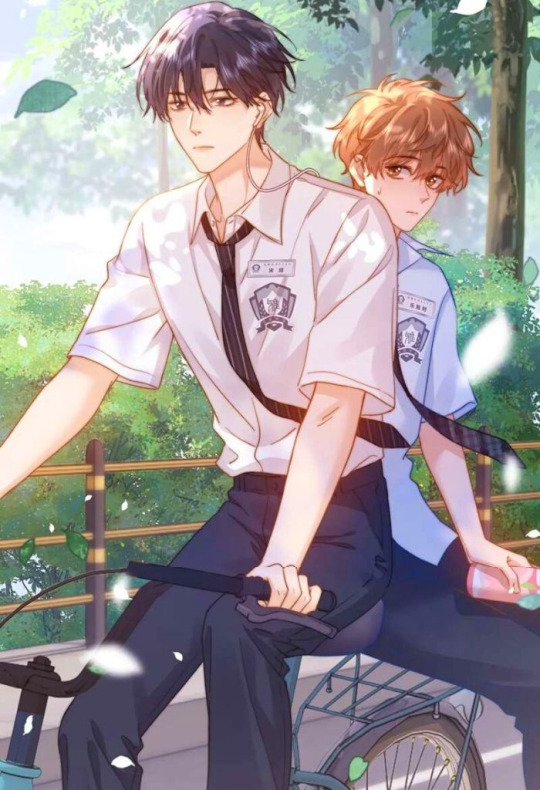
Another kind I wanted to bring up is the ones where their worlds or stories are dark, but the characters aren't necessarily. Like The Film Emperor, He Insisted on Being My Patron has a very green flag gong (he's such a puppy!), but he and the main character are up against the reddest of red flags of a villain LMDFKGSJFD.
It's also not a manhua I think people who want green flag leads would necessarily enjoy, given that beyond being "darker," it also goes into the territory of fan service-y and "problematic" nsfw content, but again, the male lead is really quite sweet to the main character despite the shitty situation they're in.

And I thought of Bu Chonghua from Tunhai aka Swallowing the Seas (another one based on a novel), since the main character there, Wu Yu, comes to see Bu Chonghua as so good and just that he pushes him away because he feels like he can't dirty such a man with his own darkness, both in his past and personality. It's a trope I really enjoy.
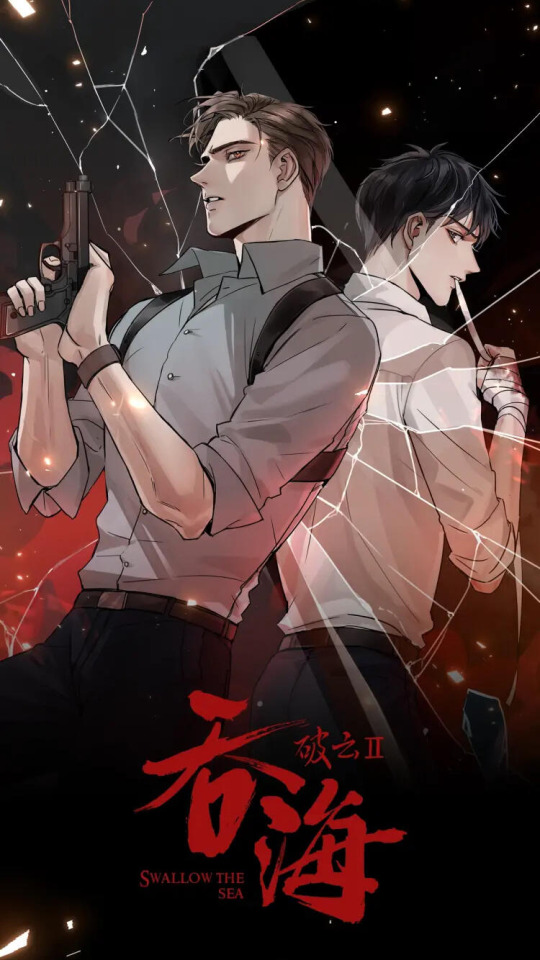
I'll briefly mention some ⚠️ spoilers ⚠️but the reason I wanted to highlight it is because: the latest chapter of the manhua has Bu Chonghua overhear Wu Yu saying he likes Bu Chonghua, and this is after Wu Yu disappeared and Bu Chonghua is worried he skipped town for good. He follows Wu Yu, all while wondering if the like Wu Yu holds for him is the same as his liking of Wu Yu, and when Wu Yu is about to be gravely injured in an underground fighting ring, Bu Chonghua steps in to save him... The chapter ends with Wu Yu holding him back pleading with him to stop because it's not worth dirtying his hands with such a man as his opponent, and that's such a delicious flavour of angst because like...Wu Yu thinks it's fine for he himself to fight against such a person, but he doesn't want Bu Chonghua to. ;-;
Oops. I didn't mean for this to become a deeper ramble of Tunhai KMSGFKGHSJ. It's just interesting to me since Tunhai and its prequel, Poyun aka Breaking Through the Clouds, may not have what the people who prefer green flag tops want in terms of content, but its tops are technically not that much of a red flag either.
Which also get us to the kind of stories where plot can also sort of outweigh whether a top/gong is a green flag or not. Like No Arguing With Mr. Mo has two characters who struggle greatly in their relationship, with the question of "are they in love?" being an overarching issue for them, meaning it's not exactly healthy, and prevents them from being fully either green or red flags.
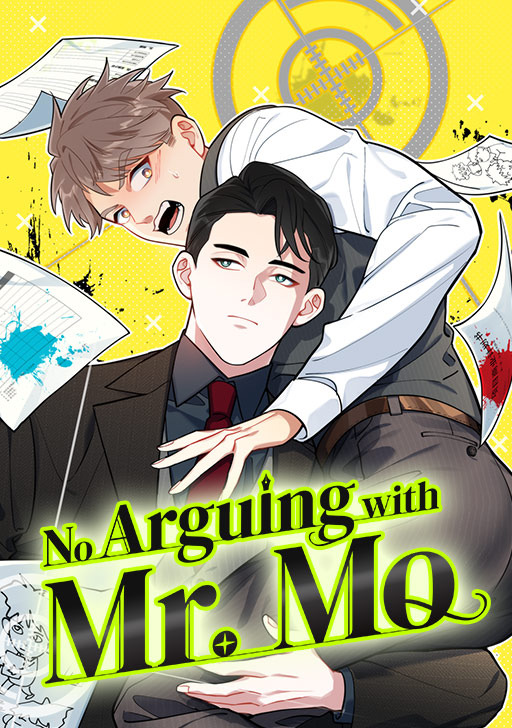
I also didn't bring up a lot of historical/xianxia manhua, which I'm sure some people may disagree with... Like the leads in Tianbao Fuyao Lu are arguably quite good, and while I haven't read Dinghai Fusheng Lu yet, I assume it's in a similar boat as something set in the same world.
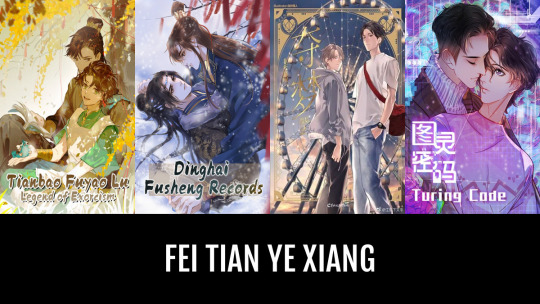
And then there's the ones that develop into green flags... Like Mo Ran starts off awful, yes, but he does become much better later on!! But I don't think that's what those people after green flags want to hear lol. Plus I'd argue Erha is best experienced in novel (or audio drama) form over the manhua anyway—the manhua feels more like something made for established fans in my opinion.
Regardless, I hope this shows that with so many listed above, many manhua actually feature male leads who really do care for their love interests in a healthy, respectful way, whether they're 100% green flags or they develop into green flags or they're not even complete green flags. ^^
Edit: Oh I forgot to link my full list of danmei/baihe manhua recs HMSKFJSKS. I currently don’t have any summaries, tags, or content warnings in this list though, but there’s quite the range of stories!:
#manhua#danmei#kuku88#kuku rambles#I ship my adversary x me#I ship my rival x me#pixiu's eatery no way out#the wife is first#you own my all#tunhai#swallowing the seas#breaking through the clouds#poyun#see you my king#beryl and sapphire#it's not that i want to wear women's clothing#how'd I get a heroine's script#pirouette into my heart#salad days#salt friend#trapping the foxy doctor#don't say you love me#falling to where I belong#falling into the pond#the guy inside me#don't pick up boyfriends from the trash bin#the protagonist just wants to fall in love#more than brothers#touch your world#long post
31 notes
·
View notes
Text
Best Siblings Bracket
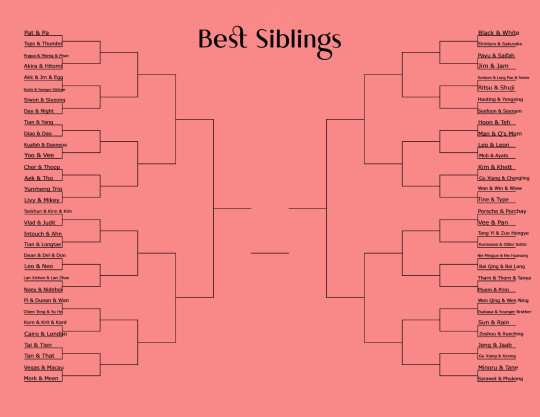
Round One
Pat & Pa (Bad Buddy) vs Tops & Thunder (Ingredients: The Series)
Prapai & Plerng & Phan (Love in the Air) vs Akira & Hitomi (Life: Senjou no Bokuro)
Akk & Im & Egg (Enchante) vs Koichi & Younger Siblings (Eternal Yesterday)
Siwon & Siyeong (Blueming) vs Day & Night (Love Syndrome III)
Thian & Yang (To Sir With Love) vs Diao & Dao (Rak Diao)
Kuafah & Daonuea (Star in My Mind/Sky in Your Heart) vs Yoo & Vee (Love Mechanics)
Cher & Thoop (A Boss and a Babe) vs Aek & Tho (Don't Say No)
Jiang Yanli & Wei Wuxian & Jiang Cheng (The Untamed) vs Livy & Mikey (Rainbow Prince)
Tankhun & Kinn & Kim (Kinnporsche: The Series) vs Vlad & Judit (Like in the Movies)
Intouch & Ahn (Until We Meet Again) vs Tian & Longtae (A Tale of a Thousand Stars)
Dean & Del & Don (Until We Meet Again) vs Leo & Neo (3 Will Be Free)
Lan Xichen & Lan Zhan (The Untamed) vs Noey & Nidnhoi (I Will Knock You)
Pi & Duean & Wan (Fish Upon the Sky) vs Chien Teng & Yu He (DNA Says Love You)
Korn & Krit & Kard (Until We Meet Again) vs Cairo & London (Gameboys)
Tai & Tien (La Pluie) vs Tan & That (Manner of Death)
Vegas & Macau (Kinnporsche: The Series) vs Mork & Meen (Fish Upon the Sky)
Black & White (Not Me: The Series) vs Shintaro & Sakurako (Minato Shouji Coin Laundry)
Payu & Saifah (Love in the Air) vs Jim & Jam (Moonlight Chicken)
Tonhom & Long Pao & Seeiw (My Only 12%) vs Ritsu & Shuji (Jack o' Frost)
Haoting & Yongxing (HIStory 3: Make Our Days Count) vs Seefoom & Seenam (Ghost Host Ghost House)
Hoon & Teh (I Told Sunset About You) vs Man & Q's Mom (21 Days Theory)
Leo & Leon (Don't Say No) vs Mob & Ayato (A Man Who Defies the World of BL)
Kim & Khett (The Shipper) vs Gu Xiang & Chengling (Word of Honor)
Wan & Win & Wiew (Between Us) vs Tine & Type (2gether: The Series)
Porsche & Porchay (Kinnporsche: The Series) vs Vee & Pan (You're My Sky)
Tang Yi & Zhuo Hongye (HIStory 3: Trapped) vs Kurosawa & Older Sister (Cherry Magic)
Nie Mingjue & Nie Huaisang (The Untamed) vs Bai Qing & Bai Lang (My Tooth Your Love)
Tharn & Thorn & Tanya (Tharntype: The Series) vs Pluem & Prim (Ghost Host Ghost House)
Wen Qing & Wen Ning (The Untamed) vs Tsubasa & Younger Brother (Kabe-Koji-Nekoyashiki-Kun Desires to be Recognized)
Sun & Rain (Dark Blue Kiss) vs Zeshou & Xueching (Plus & Minus)
Jeng & Jaab (Step by Step) vs Gu Xiang & Wen Kexing (Word of Honor)
Minoru & Tane (Our Dining Table) & Sarawat & Phukong (2gether: The Series)
#bl bracket#bl drama#bl shows#best siblings#bad buddy#ingredients#ingredients the series#love in the air#lita#life senjou no bokura#enchante#eternal yesterday#blueming#love syndrome iii#love syndrome 3#to sir with love#rak diao#star in my mind#sky in your heart#love mechanics#a boss and a babe#don't say no#the untamed#rainbow prince#kinnporsche the series#kinnporsche#like in the movies#until we meet again#uwma#a tale of a thousand stars
64 notes
·
View notes
Text
So, I said this a while ago but now that I finally have finished JWQS, I can properly go into detail.
JWQS is happy ending beefleaf- but specifically, Qi Yan is soooo He Xuan coded.
They both want to enact revenge.
We learn at the end of the Black Water arc that Ming Yi has been He Xuan this entire time- and the whole point of him being Ming Yi was to seek revenge for his family, who died because of Shi Qingxuan's brother- Shi Wudu. Qi Yan is in a similar position- her entire family and tribe were wiped out by Nangong Rang (+ Ding Yi and Lu Quan), so she goes undercover in able to truly enact her revenge plan.
They both fall in love with their enemy
sort of. Most TGCF Fans also ship beefleaf so this isn't a reach to say, I think. He Xuan, as Ming Yi, has an incredibly close relationship with Shi Qingxuan- Shi Wudu's sibling. By He Xuan's logic, technically Shi Qingxuan is his enemy- so, naturally, they must be apart of his revenge plans. Shi Qingxuan is the very reason why their fates were switched, and why He Xuan's family died, so even though SQX didn't necessarily switch their fates... they are still partially the reason as to why HX's family is dead. Yet, HX still obviously has a soft spot for SQX (regardless of if you ship beefleaf or not).
The same could be said for Qijing. Nangong Jingnu's father is the reason why Qi Yan's tribe is, for the most part, gone- and it's very obvious throughout the book that Qi Yan places blame on all of the Nangong Imperial clan. But even still, Qi Yan manages to find a way to open up her heart and fall in love with Nangong Jingnu- the daughter of her enemy.
They constantly push their plans of revenge back to enjoy more time with their beloved
He Xuan had countless times to enact his plan of revenge- there was no reason for him to have to wait as long as he did. Yet, he waited until the very last moment- until Shi Wudu's third heavenly calamity, because he knew that when SWD passed it, he would no longer be able to follow through with his plans. Why did he wait, though? Because of SQX. He wanted extra time with them, he wanted to enjoy the momentary happiness he felt with them while he still could- because after he kills their brother, that's it for them.
Qi Yan acknowledges throughout the book that once she kills Nangong Rang, her relationship with Jingnu will never be the same. So, she continues to push back her plans. She goes for everyone else first- Nangong Ping, Nangong Wang, Nangong Wei and Nangong Zhen (to an extent). She waits until the absolute last minute, she waits till Nangon Rang is already on his death bed, to finally kill him. All because she wants every with Nangong Jingnu to stay exactly as they are- happy, and content.
both are scholars
This one doesn't need that much explaining. Qi Yan's whole plot line in the beginning is becoming a top tier scholars just to infiltrate the court- which, fortunately, is put to a halt immediately once she was arranged to marry Jingnu. He Xuan, in Fu Gu, was known as "Scholar He". His dream was to be a Scholar, but the testers didn't like him and constantly sabotaged him so that he wasn't able to pass the test. They let him pass eventually- but by then, it was already too late.
Both drop hints and allude to their beloved as to who they truly are to see their reactions and justify sparing them in the end
Throughout the entirety of the Black Water arc, Ming Yi is alluding to and hinting at who he truly is. He is the one who creates the array to Fu Gu, where they just "happen" to stumble upon the Bloody Fire Social. He intentionally brought them there, to show SQX- look, this is what happened to me -to try and get them to realize. Even when XL accuses MY of being the Reverend, SQX still doesn't realize it. And then, at the terrace of cascading wine, HX (as the reverend) tells SQX what really happened- how they only ascended because their fate was switched with Scholar He's. And yet SQX still does not realize it- but they condemn their brother. Still, in the end, HX spares them even if he had to watch them still defend their brother.
Something similar happens with Qijing. Though, at first, Qi Yan wasn't intentionally hinting at it- the scene where Jingnu sees the piercing hole in her ear and is confused is proof that this was accidental. But later on, Qi Yan starts to be more obvious about it. She retells stories of the Grass Plains, including the war, to get Jingnu to sympathize- she hints at her being a woman, at her being Qiyan Agula. It's all in an effort to see how Jingnu reacts, to justify her thoughts of sparing her and of falling in love with her.
both disappear once their job is done
He Xuan, presumably, slinks back into either Blsck Water Manor or just the ocean that is his territory and is only seen again towards the final chapters to save the capital city.
Qi Yan disappears to Chiongtai with Ding You and is essentially off-the-grid for 5 years.
Of course, the one major difference between these two is that while beefleaf gets a bad ending, Qijing gets the good one. He Xuan and Shi Qingxuan never (supposedly) see each other again after the Black Water arc, apart from that chapter where He Xuan helps to save the capital, and they never speak. Qijing gets the happy ending- Jingnu finds Qi Yan, and though Qi Yan has lost all of her memories... she manages to remember Jingnu, just a bit. They can live happily together.
All in all, I love these two couples very much snd they both deserve happiness. Justice for beefleaf!!!
#heaven official's blessing#tgcf#beefleaf#tian guan ci fu#jwqs#jing wei qing shang#jwwj#two adamant hearts#he xuan#shi qingxuan#ming yi#qi yan#qiyan agula#nangong jingnu#qijing#these two sre so very similar#how has no one else pointed this out#justice for beefleaf
29 notes
·
View notes
Text
Round 1 of 8, Group 1 of 8


propaganda and summaries are under the cut (May include spoilers)
Code Geass: 2.25 Re;
Lelouch tries to persuade Nunnally into giving him the key of Damocles as the battle concludes.
Word of Honor: 1.34 Ep 34
Ye Bai Yi instructs Lao Wen to close down Ghost Valley forever and the crowd disperses peacefully. The victors have drinks where Lao Wen reveals how he had managed to convince everyone around him to get along with the plan. Zhou Zi Shu is happy for him, but in pain that he only had a few more days left to survive. Scorpion King has a talk with the now disabled Zhao Jing in which he reveals his true intentions and feelings about what he thought about him. A drunk Lao Wen elatedly describes that meeting Ah' Xu had changed him. He asks him to accompany him to his parents' old hometown for a proper burial and Ah' Xu tearfully agrees. At Ghost Valley, preparations for Ah' Xiang's wedding takes place. Aunt Luo tells her plan to stay at the valley forever with Qian Qiao, who had decided to drink the Water of Lethe and forget Yu Qiu Feng. Cao Wei Ning is increasingly nervous and confesses that he had always hoped that his wedding would be attended by his seniors and Masters. The Gentle Wind Sword Sect arrives and Mount Qingya and they are let in. Master Mo Huai Yang openly disrespects Ah' Xiang. (Source: MyDramaList)
(Spoilers) Look the emotional rollercoaster this episode is like Wen Kexing finally got his revenge and Ye Bayi is like just close down the ghost valley and we'll call it even and it's like yes!!!! No more bloodshed!!!! And everyone is having dinner together and Wen Kexing is literally having the best day of his life!!! But then Zhou Zishu is like dealing with all the turmoil and angst that WKX's little stunt put him through and that he's going to die in a few days but nobody knows and he doesn't want to bring down the mood and then there's heartbreaking scene where WKX is drunk and is so happy and cuddling ZZS and is like I'm so happy you're my soulmate and everything is great and we'll travel the world together this is amazing!!! And you can see the pain on ZZS's face because WKX doesn't KNOW!!!! And then there's the confrontation between Scorpion King and Zhao Jing which is !!!!!!!!!!!! And then they're preparing for Gu Xiang and Cao Weining's wedding!!!!! And it's so sweet because everyone is just so happy!!!! And like WKX is in full dad mode which is great. But it's just like an episode where the characters can just all love each other because there's no sign of immediate danger (well besides ZZS' stuff) but like it's so heartwarming and sad and tragic when you know what happens right after like !!!!!!!!!!!!
It's also one of the highest rated episodes (on mydramalist) with a 9.3 so there's that too
https://www.youtube.com/watch?v=k9zRSFzOfTc&t=1230s
22 notes
·
View notes
Text
Shipping Game
Saw this shipping game a while ago so thought I would join in.
First ship: Chihiro x Haku (Spirited Away)

First OTP: Mirafreed (Mirajane Strauss x Freed Justine) (Fairy Tail)

Current favourite ship: Thatcher Davis x Ruth Weaver (The Mandela Catelogue)


Ship since first minute: LuLin (Lu Bixing x Lin Jingheng) (Can Ci Pin/The Defective)

Ship you wished had been endgame: Don't actually have one now I think about it...if I had to pick one though...Maebara Keiichi x Ryugu Rena (Higurashi no Naku Koro Ni/When They Cry)
(I think I would have cried if they were endgame)

Ship you wished was canon: FengQing (Feng Xin x Mu Qing) (Tian Guan Ci Fu/Heaven Official's Blessing)

Ship that most of the fandom hates but you like: Any combo of the Yi City Quartet (Song Lan, Xiao Xingchen, Xue Yang & A-Qing) (Mo Dao Zu Shi/The Grandmaster of Demonic Cultivation)
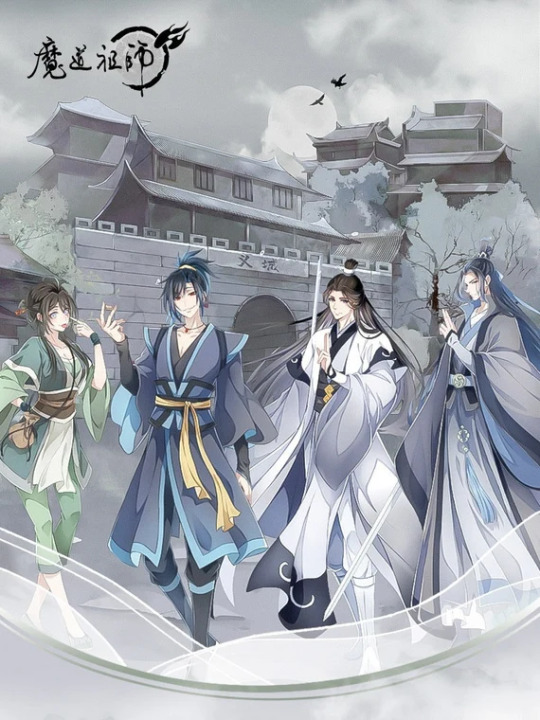
You don't watch the show but like the ship: XiMeng (Mo Xi x Gu Meng) (Yuwu/Remnants of Filth)

Ship that you wished had a different storyline: MuLian (Mu Qing x Xie Lian) (Tian Guan Ci Fu/Heaven Official's Blessing)
(Need more content for them T_T)
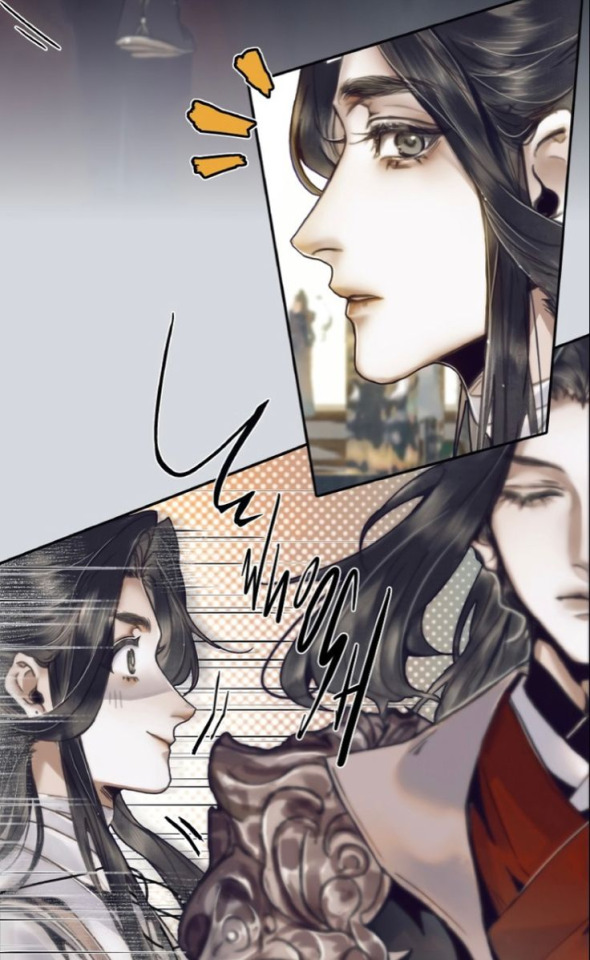
Favourite ship that is endgame: (putting two ships here because I can't choose!)
WangXian (Lan Wangji x Wei Wuxian) (Mo Dao Zu Shi/The Grandmaster of Demonic Cultivation)

Araragi Koyomi x Senjougahara Hitagi (Monogatari Series)

Tagging: @bleppities @biblenabading @muqingssaber @paljuresji @autheane @sofyflora98 @tearyphoenixx @sadghostgirl511
Feel free to pass this on :-)
#spirited away#sen to chihiro no kamikakushi#fairy tail#mirafreed#the mandela catalogue#thatcher davis#ruth weaver#can ci pin#lulin#higurashi#rena ryugu#keiichi maebara#fengqing#tgcf#xue yang#xiao xingchen#song lan#a qing#mdzs#yuwu#mo xi#gu meng#mulian#wangxian#araragi x senjogahara#monogatari series#shipping#my poor brain
24 notes
·
View notes
Text
“The wildfire in the fields can’t be extinguished, the spring breeze blows and it grows again.” Wei Wuxian’s Spell (MDZS only) (Farewell on the Ancient Grassy Plain 赋得古原草送别 by Bai Juyi 白居易)
Before I proceed, I just wanna say that this was the poem that inspired me to take up translation. 😍😍. I learned and analysed it back in school, so when I read it in MDZS, I knew I had to make a post about it. Yes, I know I’m such a geek. Everyone wants to translate wangxian smut but I was aiming for this. But LOL the my translation never got there FML so here it is anyway.
If there was a list of “top 10 famous Chinese poetry”‘s online, this would definitely be it along with Li Bai’s 静夜思(Through the Quiet Night). In MDZS, Wei Wuxian uses this poem in Chapter 76 to animate the effigies. So just what does it mean and what is his relation to the novel?
This poem was written in the Tang Dynasty by Bai Juyi. In the poem, the author sends off his old friend on his journey , and bades him farewell.
There’s an interesting backstory to poem. Firstly, this is a “赋得” which means that this was a poem that the author wrote for exam purposes. 😂. So yes, this was his examination essay. The topic was “to bade farewell on the grassy plain”.
So the story is that the examiner Gu Kuang looked at his essay, then commented “米价方贵,居亦弗易 Chang An’s rice is expensive, it’s not easy to freeload! (this is a pun on the author’s name. He shortened the poet’s name to Ju Yi 居易, which means to stay for free)”. But as he read on, he was subsequently very impressed with the poem, particularly the famous line (which was used in MDZS) “野火烧不尽,春风吹又生 The wild fire in the fields can’t be extinguished, the spring breeze blows and it grows again.” And since then, the poem has been praised for the way it describes the grass full of life, its symbolism (the never say never ideal), the imagery and sadness when he sends his friend off.
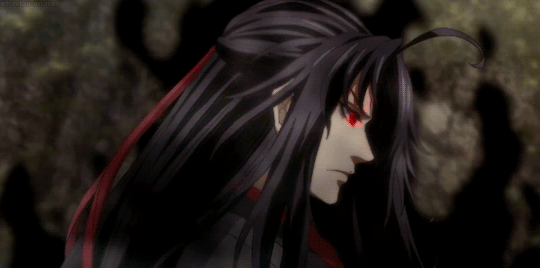
离离原上草,一岁一枯荣。
The ancient plains are filled with lush green grass, it withers and prospers every year
野火烧不尽,春风吹又生。
The wildfire in the fields can’t be extinguished, the spring breeze blows and it grows again. (This is the famous line/idiom)
远芳侵古道,晴翠接荒城。
The scent of spring grass from afar has invaded the ancient path, a sea of green has permeated the abandoned city
又送王孙去, 萋萋满别情。
I’m here to send my friend off, the lush grass is filled with my parting feelings.
ANALYSIS - with relation to MDZS
"野火烧不尽,春风吹又生 The wildfire in the fields can’t be extinguished, the spring breeze blows and it grows again,” is now a commonly used idiom to describes tenacity and grit; the grass that thrive again after it has been burned by wildfire.
When I first read this, I felt this poem was a shout out Wei Wuxian. He persevered when faced with adversity multiple times. And imagery of “spring grass” in this poem is particularly fitting descriptor of him; it’s full of life and adaptable to any circumstances. It even grows in the most barren of conditions, such as the ancient paths and the abandoned city. (Burial Mounds, I'm looking at you XD)
Secondly, the last line of the poem also reminds me of Lan Wangji. It gives off an image of someone sending off a friend, but he can’t send his said friend off the entire way, so he hopes the grass which have grown everywhere would do convey his feelings. isn’t that lwj when he realises Wei Wuxian has passed away the first time? :( Or perhaps that's Wei Wuxian's feelings when Lan Wangji and himself were on different paths (The Ghost path vs the orthodox Cultivator Path)
Additional Links:
Wei Wuxian's Spell - "Her Shy Charming Eyes"
More MDZS Meta
Poetry Analysis
62 notes
·
View notes
Text
Tilling the fields, QMYS, Section 1
The Qimin yaoshu齊民要術 (“Essential Techniques for the Common People) by Jia Sixie (fl. c. 540), is the oldest Chinese agricultural treatise to survive in its entirety. Jia Sixie served as a mid-level official of Eastern Wei,as such the focus is on the dryland farming practices of his home region in modern Shandong rather than the wet rice agriculture of Southern China. The book itself mixes Jia Sixie's own advise and descriptions with quotations from earlier works, many of which are now lost. The QMYS is therefore not just an important source for the author's own times, but for the agricultural writings and practices of the preceding centuries.
Section 1 covers the different aspects of tilling the fields in preparation for cultivation, and contains advise for how to clear new fields, ploughing, harrowing, different soil types, and so on.
(To go straight to the translation, jump to "Section 1, Tilling the Fields")
[Translator's preface]
[The QMYS is not illustrated, but texts of this nature really should come with some visual aides. I have therefore included here some drawings and pictures from later eras. All images from Wikipedia.
[Farming tools]
Han era scholars agreed that China's first plough had been a tool called leisi耒耜, but lacked a clear of concept of how it actually looked like. Later authors simply repeated their statements. The drawing below from Wang Zhen's (1271-1333) Nongshu is therefore at best a reconstruction from literary evidence.
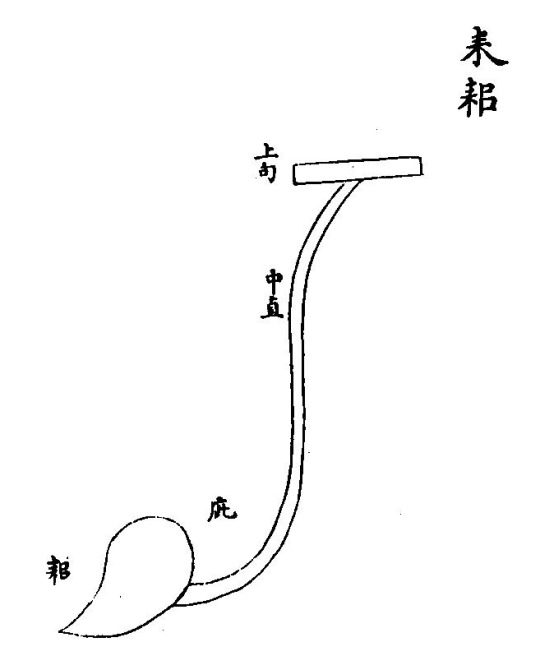
(Leisi耒耜, from Wang Zhen's Nongshu)
The main plough was instead the ox-pulled li犂 frame-plough.

(Li犂, from Wang Zhen's Nongshu)
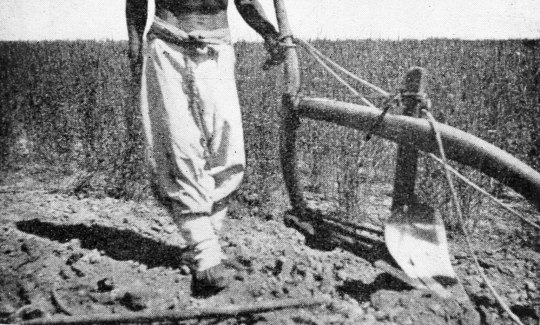
(Shantung plow, from King, 1911, Farmers of forty centuries)
QMYS also refer to the lighter feng鋒 plough.

(Feng鋒, from Wang Zhen's Nongshu)
The QMYS is the oldest Chinese text to refer to the iron-tined harrow, which it refer to as loucou𨫒楱

(Ba耙, from Wang Zhen's Nongshu)
The lao勞 bush-harrow was made by weaving thin sticks around the cross-bars.
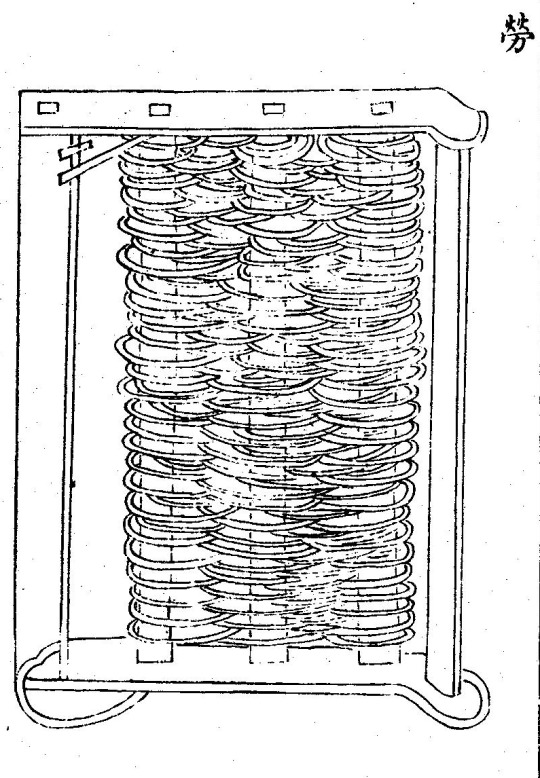
(Lao勞, from Wang Zhen's Nongshu)
The preferred tool for sowing was the seed drill, lou耬
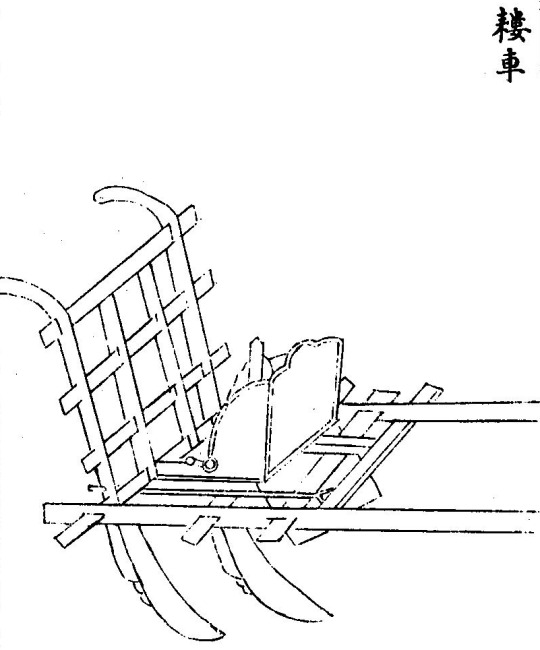
(Louche耬車, from Wang Zhen's Nongshu)
In addition to these ox-drawn tools, there were of course a varity of manual tools in different shapes and sizes, hoes, shovels, etc.
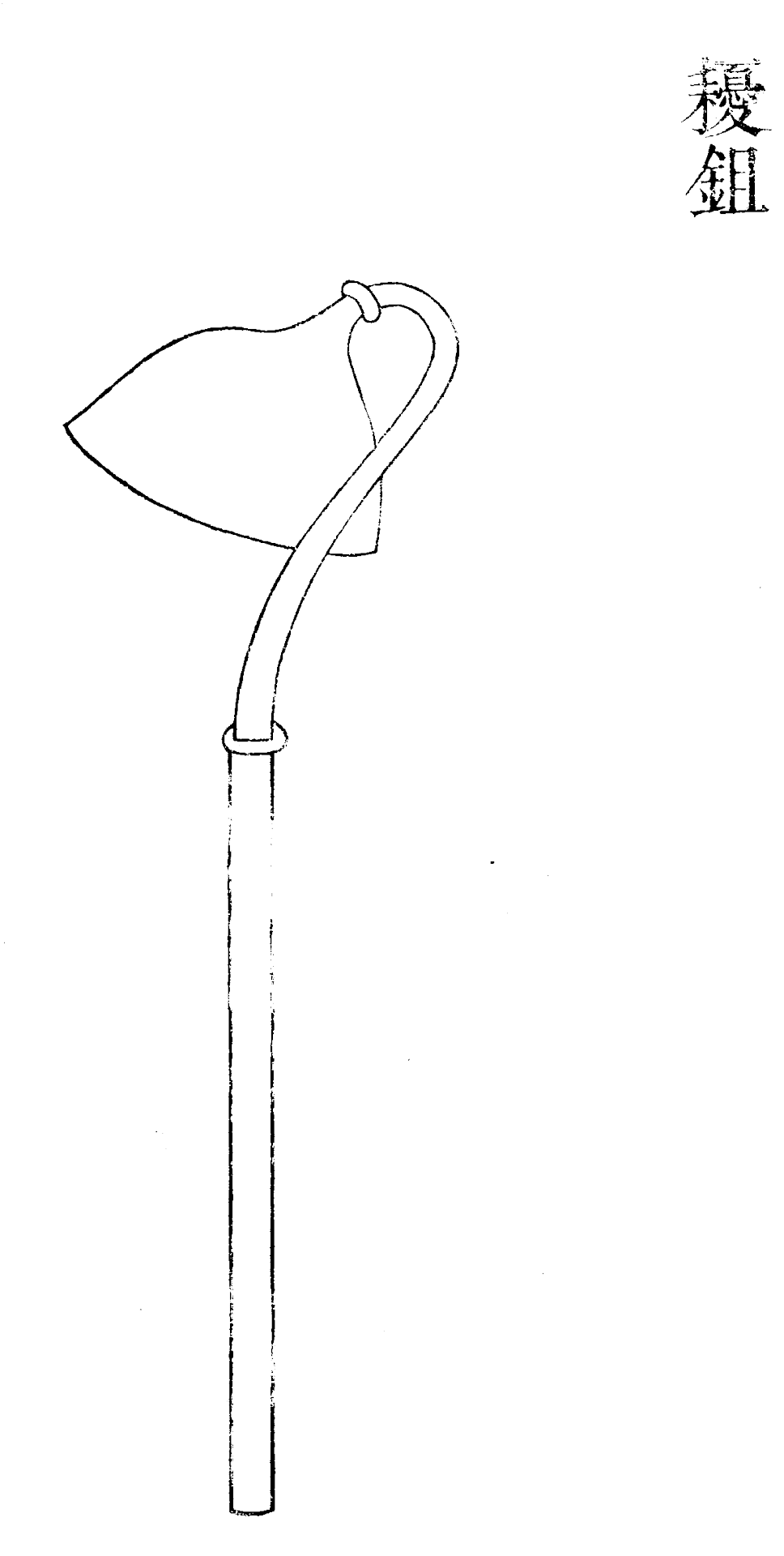
(Youchu耰鋤, from Wang Zhen's Nongshu)
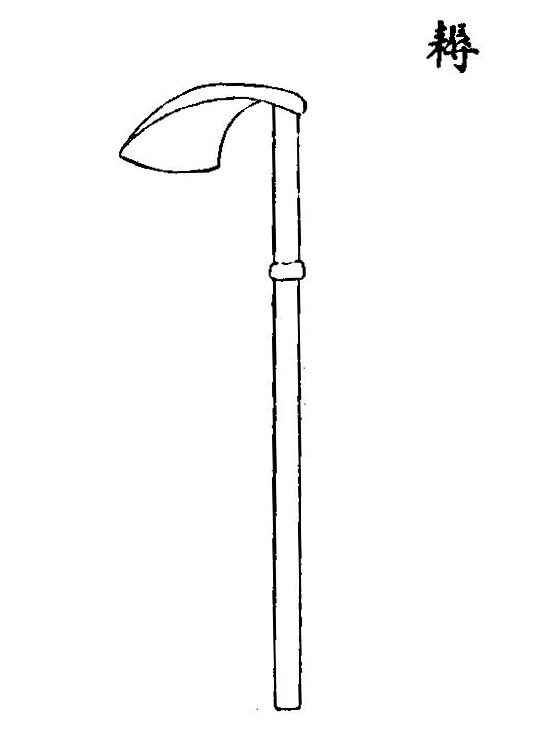
(Nou耨, from Wang Zhen's Nongshu)
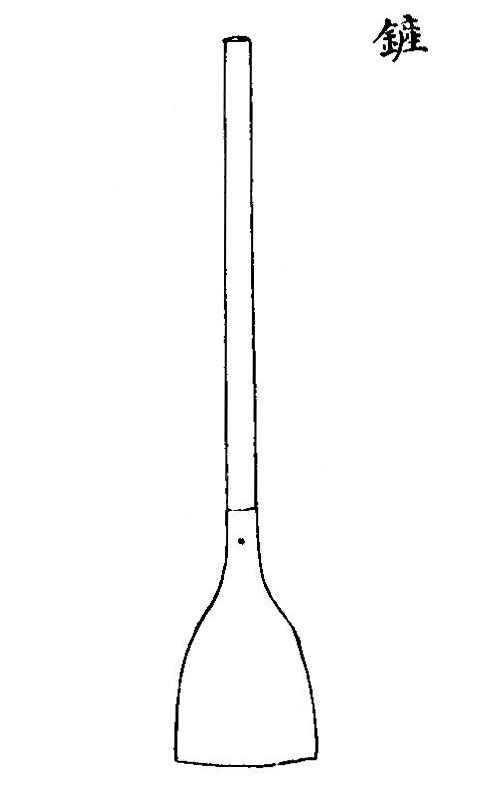
(Chan鏟, from Wang Zhen's Nongshu)
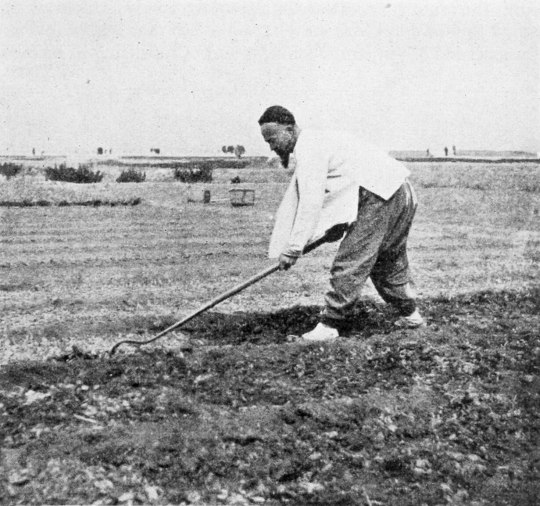
(Method of using the broad, heavy hoe in producing surface mulch, as seen in Shantung, China, from King, 1911, Farmers of forty centuries)
[Crop plants]
Later sections of QMYS treats the cultivation of the individual crops in much larger detail.
Foxtail millet (Setaria italica), gu穀, was the main staple crop.

Broomcorn millet (Panicum miliaceum), shu黍
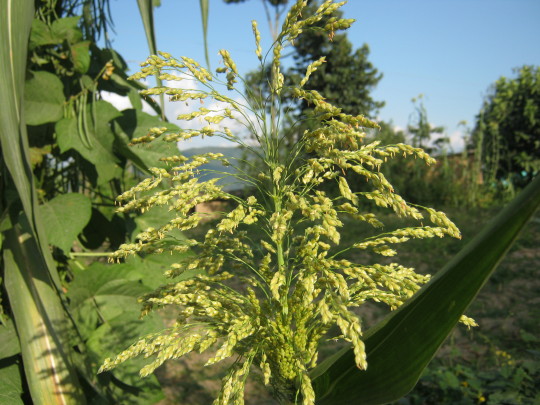
In addition to gu and shu, different varieties of foxtail and broomcorn millet were known under a large number of other names.
Mung beans or green gram (Vigna radiata), lüdou緑豆 (lit. "green beans"), used as green manure in crop rotation with millet

Adzuki beans (Vigna angularis), xiaodou小豆 (lit. "small beans") served a similar function
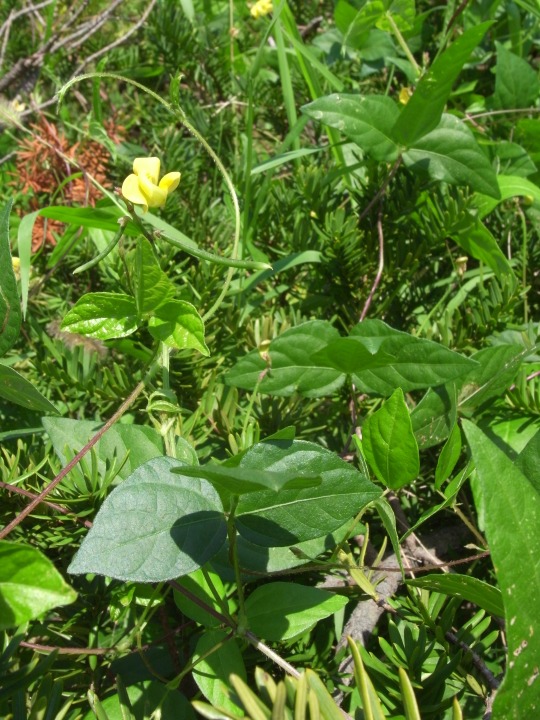
Wheat (Triticum aestivum), mai麥 (same name also used for barley) was primarily a winter crop in ancient China.

[Books quoted by QMYS in Section 1, in order of appearance]
The Zhoushu周書 (“Book of Zhou”), also known as the Yi Zhoushu逸周書, is a Warring States era collection of documents about Western Zhou, but the book has a complicated textual history. It is quoted once in QMYS, in Section 1. The quoted text is not found in the transmitted version.
The Shiben世本 (“Generational Roots”) records the genealogies of mythical rulers, the origin of the clan names, and mythological and historical inventors. Several versions existed, by different authors. The full text now lost, but it is quoted numerous times in other works. It is quoted once in QMYS, in Section 1.
The Lüshi chunqiu呂氏春秋 (“Spring and Autumn of Mister Lü”) is a collection of treatises and essays attributed to the retainers of Lü Buwei, the (in)famous Qin chancellor. It covers a very wide range of topics.
The Erya爾雅 (“Approaching the Correct”) is the oldest surviving Chinese glossary. Modern scholarship dates the book to the late Warring States and/or early Western Han periods. It is quoted numerous times in QMYS.
The Jianwei shiren犍為舍人, the “Retainer from Jianwei”, lived during the reign of Emperor Wu of Han and wrote a commentary on the Erya. The book is now lost. The quote in Section 1 is the first of three in QMYS.
The Zuanwen 纂文 (“Compiled Graphs”) by the Liu-Song scholar and historian He Chengtian何承天 (370 – 447) is now lost. It is quoted once in QMYS, in Section 1.
The Shuowen 說文 (“Explaining Graphs”) by Xu Shen許慎 (c. 58 – c. 147) analyses the composition and reasoning behind the different characters. It is quoted numerous times in QMYS.
The Shiming釋名 (“Analysing Names”) by Liu Xi劉熙 is a glossary in the style of the Erya written c. 200 AD. The quote in Section 1 is the first of three in QMYS.
The Liji 禮記 (“Ritual Records”) is a collection of ritual treatises compiled from older texts during Former Han, it became part of the textual canon as one the Five Classics and also as one the Three Ritual Classics. Its usage in QMYS is restricted to the Yueling chapter.
The Yueling月令 (“Monthly Orders”) chapter of the Liji is a calendrical treatise describing for each of the twelve months the position of the stars and other seasonal markers, important state rituals, and which activities should be undertaken in each month. Its inclusion in the Liji ensured it what read by every person aspiring to an education and it inspired a whole genre of similar texts, such as the Simin yueling. It is extensively quoted in QMYS.
Zheng Xuan鄭玄(127 – 200) was a famous scholar at the end of Han who wrote an influential commentary on the Three Ritual Classics. In QMYS quotations from the Yueling and Zhouguan are usually accompanied by quotes from his annotations.
Mengzi孟子 (“Master Meng”, theLatin Mencius) collects the teachings of the famous Warring States era philosopher Meng Ke (372–289 BC). The quote in Section 1 is the first of three in QMYS.
Wei Wen-hou魏文侯, Marquis Wen of Wei, ruled Wei during the early Warring States era. The single quote in QMYS attributed to him is found in the Huainanzi.
The Book of Miscellanea on Yin and Yang雜陰陽書 was apparently written during the early Han, but is now lost outside the quotations in the QMYS. The quote in Section 1 is the first of eight in QMYS.
Gao You高誘 lived at the end of Han and wrote commentaries on several texts, including the Lüshi chunqiu and the Huainanzi. The quote in Section 1 is the first of eight in QMYS.
The Huainanzi淮南子 (“Masters of Huainan”) is a collection of philosophical treaties compiled during Western Han at the court of Liu An (179 – 122 BC), vassal king of Huainan. It covers a wide range of topics. The quote in Part 9 is the second of nine in QMYS, the first being in the preface (which I have impudently skipped).
The Fan Shengzhi shu氾勝之書 (“Book of Fan Shengzhi”) is the oldest known Chinese agricultural treatise. Fan Shengzhi might originally have been an easterner, but during the early Western Han served as an official in the Guanzhong region. The original book has been lost, but it is extensively quoted in the QMYS, and also by Tang and Song encyclopedias.
Cui Shi崔寔 (d. c. 170) was a Han official and author of multiple works, including the Simin yueling and Zhenglun.
The Simin yueling 四民月令 (“Monthly Orders for the Four People”) is written in the style of the Liji Yueling, detailing each month's agricultural activities at the large estates of late Han North China. The original book is lost except as fragments in other books. It is very extensively quoted in the QMYS.
The Zhenglun政論 (“Essay on Government”) criticizes what Cui Shi considered the decline in morals and lax administration of law in his time. The original book is lost except as fragments in other books. It is quoted once in QMYS, in Section 1.
[Lettered notes]
The original text is a mix of large and small characters. I have collected the small text sections together in idented lettered notes within {} brackets.]
[Translation starts here:]
Section 1, Tilling the Fields
[Dictionary definitions]
The Book of Zhou says: “In the time of the Divine Farmer, Heaven rained millet [su粟]. The Divine Farmer thereupon tilled and planted it. He created pottery, cast axes and hatchets, and made the plough-shaft and ploughshare [leisi耒耜], the long- [chu鉏] and short-handle hoe [nou耨], to clear the grass and thickets. Afterwards the Five Grains supported and helped, and the Hundred Fruits were stored in abundance.”
The Generational Rootssays: “Chui created the plough-shaft and ploughshare. Chui was a vassal of the Divine Farmer.”
The Spring and Autumn of Mister Lüsays: “The ploughshare is six cun wide.”
The Eryasays: “To mow[qu斪] or weed[zhu斸] are spoken of as to settle [ding定].”
The Retainer from Jianwei says: “To mow or weed is to hoe [chu鋤]. They are names for settling.”
The Compiled Graphssays: “In the way of tending sprouts, the long-handle hoe [chu鋤] is not as good as the short-handle hoe [nou耨], the short-handle hoe is not as good as shovel [chan鏟]. A shovel is two chi long, with a blade two cun wide, and is used to level the ground and remove grass.”
Xu Shen's Explaining Graphssays: “The plough-shaft [lei耒] is for hand-tilling with a curved wood. The plough-share [si 耜] is the plough-shaft's straight end. The weeder [zhu斸] is for cleaving [zhuo斫]. In Qi they speak of it as the ziji鎡基. Some say the axe handle [jinbing斤柄] is curved by nature. A field [tian 田] is laid out [chen陳]. Where is planted grain is called a field. [The graph] resemble four 口, and the 十 is the pattern of paths and cross-paths. To till [geng耕] is to plough [li犂]. [the graph] comes from “plough-shaft” 耒 with the “well” [jing井] sound. Some say it is the ancients' well field [system.]”
Liu Xi's Analysing Names say: “A field [tian田] is full [tian填]. The five grains fill up within it. A plough [li犂] is profit [li利]. To profit, turn over the soil and cut off the grass at the root. The short-handle hoe [nou耨] resembles hoeing [chu鉏], with crouched back hoe among the stalks. To weed out [zhu] is to execute [zhu誅] someone. The ruler uses execution to dig up a matter at the root.”
[General advise]
In general, when opening uncultivated mountain and marsh fields, always in the 7th Month cut down and mow them. When the grass has dried, set fire to it. Arriving at spring, begin to clear out those of its groves where the wood is large, peel off the bark to kill them. When the leaves are dead and not casting shadow, they will readily yield to tilling and planting. After three years, when the roots have withered and the stalks decayed, use fire to burn them (entering the ground fully), till the uncultivated land to the end, and use an iron teeth loucou𨫒楱 harrow to rake it twice everywhere, hurl broomcorn non-glutinous millet, and bush-harrow [lao勞] it again twice everywhere. Next year then it is fitting to be a millet field.
In general when tilling eminent or inferior fields, do not ask about spring or autumn, [you] must pay attention to dry or wet to obtain what will be good. If flood and drought are not in concert, it is better with dry and not wet {A}. For the spring tilling, immediately take in hand the harrowing{B}. For the autumn tilling, wait for the turn to white to harrow{C}. [When the soil starts to dry, the surface turns white, which Jia Sixie refers to as 白背.]
{A: With dry tilling, then even if there are earth-clods, as soon as there is rain, the earth will pulverize and dissolve. With wet tilling, it will harden when it dries, and for several years will not be good. The proverb which says: “Wet tilling and damp hoeing is not as good as going home.” tells that it is of no gain and will be damaging. In the case of wet tilling, when it turns white quickly use the loucou on it, and there will likewise be no injury. If not done, it will be very bad.}
{B: The ancients said you耰, now we say lao勞. The Explaining Graphs says: “The you is a tool for rubbing [mo摩] the fields.” Now people also name the lao bush-harrow a “rubber” [mo]. A vulgar saying is “till the field with the rubbing harrow”.}
{C: During spring, there is much wind, and if [you] do not soon harrow, the earth will surely be empty and dry. During autumn the fields are soaked solid, and wet harrowing will make the earth stiff. The proverb which says: “To till and not to harrow is not as good as making it go to waste” perhaps tells that wetlands are difficult to handle, and delights in Heaven's timely chances. Huan Kuan's essay on Salt and Iron says: “Underneath a thick grove there is no lush grass. Between large clods there are no excellent sprouts.”}
In general, autumn tilling want to be deep, spring and summer tilling want to be shallow. Ploughing want to be narrow, harrowing want to be double{D}. In the autumn to till and cover over what is green is the best.{E} The earliest tilling want to be deep, and the turned over earth want to be shallow.{F} On land with themeda or cogon-grass [jianmao菅茅], [you] ought to let loose cattle and sheep to trample it. Then if in the 7th Month [you] till it, it will die{G}.
{D: Plough narrow and till finely, the ox then will not tire. Double-harrow and the land will ripen, during drought it will likewise protect the moisture.}
{E: Reaching the winter months, the green grass that has regrown will be as excellent as adzuki beans [xiaodou小豆].}
{F: If the tilling is not deep, the land will not ripen. If the turned over is not shallow, the stirring will bring forth the soil.}
{G: If not the 7th Month, it will regrow.}
In general, the rule for excellent fields, is for mung beans [lüdou緑豆] to be first, adzuki beans and sesame [huma胡麻] is next to it. Thoroughly for all of them sow densly [?] within the 5th and 6th Months, and in the 7th and 8th Month plough and cover over to kill them. [This] will make a spring millet field with a harvest of ten shi on the mu, in excellence comparable to silkworm excrement and mature manure.
In general, after the autumn harvest, the oxen's strength will be weak. For those not yet caught up for autumn tilling, at the bringing down of [?] the foxtail [ gu穀], glutinous broomcorn [shu黍], non-glutinous broomcorn [ji穄], large grained [liang 粱], and glutinous foxtrail [shu秫]millets' stubble, then move the exhausted ones to quickly use the “spear-point plough” [feng鋒] on it. The ground is regularly soft and moist, and is not hard and tough. Then when arriving at the beginning of winter, [you] usually get to till and harrow, and not worry about it being dried up and arid. If the oxen's strength is small, only harrow it once during the 9th and 10th Months, and arriving at spring, sow without ploughing [?], is also doable.
[Excerpts from the Monthly Orders on tilling]
[This whole subsection consists of quotation from the classic text the Monthly Orders [Yueling 月令], a chapter of the Ritual Records [Liji禮記], accompanied by quotations from commentary by the Eastern Han scholar Zheng Xuan.]
The Ritual Records' Monthly Orderssays: “In the Month of First Spring, … the Son of Heaven therefore on the inaugural day pray for grain to the High God [shangdi上帝]{H}. Then, selecting the inaugural chen day, the Son of Heaven personally conveys the plough-shaft and ploughshare. … He leads the Three Excellencies, the Nine Dignitaries, the various feudal lords, and the great men, to till themselves the God's Acre [Di ji帝籍]{I}. This Month, Heaven's breath descends down and Earth's breath rises up. Heaven and Earth are in harmony with each other, and the grasses and trees sprout and stir{J}. … He instructs the ministers for the fields{K}. They skilfully assess the hills and mounds, the slopes and defiles the highlands and lowlands, for what is suitable among the land and ground, and what to plant of the Five Grains, so as to teach and guide the people. … Field affairs having been put in order, he first settles the guidelines and responsibilities. Agriculture was therefore not in confusion. ...”
{H: Zheng Xuan's Annotations says: “It speaks of the first xin day, and the suburban sacrifices to Heaven. The Spring and Autumn Transmittals says: 'In spring the suburban sacrifices to the Lord of Agriculture [Houji后稷] to pray for farming affairs. Thus after the commencement of hibernation, the suburban sacrifices. After the suburban sacrifices, the tilling.' The High God is the god of the Grand Tenuity [taiyi太微].”}
{I: “Inaugural chen is perhaps a propitious chen day after the suburban sacrifices. … The God's Acre is the field by which is regulated the Heavenly Divinity's lending the people strength.”}
{J: “This is the yang breath ascending through the surface, a portent that there can be tilling. The Book of Agriculture says: 'For the best growth cover over the stakes. When they show the base and can be pulled out, those who till urgently set out.”}
[This Book of Agriculture [nongshu農書] is apparently the same as the Book of Fan Shengzhi which is quoted in more detail on this topic further down.]
{K: “With minister it speaks of the 'field surveyors', the officials in charge of agriculture.”}
“In the Month of Middle Spring, … those who till have a short rest, they then repair their gate and door leaves [heshan闔扇]{L}. There are no great affairs undertaken which would hinder agricultural affairs. … ”
{L: 'Rest' [she舍] is similar to 'pause' [shi止]. Hibernating insects open doors, and with tilling affairs a little tranquil, they then put in order their gates and doors. When they use wood it is called he闔, when they use bamboo or reeds it is called shan扇.”}
“In the Month of First Summer, … he encourages agriculture and motivates the people, and there are not anyone who neglects the season{M}. … He instructs the farmers to apply themselves to action, and not rest at the capital{N}. ...”
{M: “He puts weight and effort in encouraging [them?] to come to him.”}
{N: “He presses and urges the farmers. … The Rites for the King Residing in the Bright Hall says: 'There are no sojourners in the state'.”
“In the Month of Last Autumn, … The hibernating insects altogether curl up inside, and everyone plaster their doors.{O}”
{O: “With 'plastering' [jin墐] it speaks of smearing plaster [tu塗] to shut them. This is to avoid the killing[?] air.”}
“In the Month of First Winter, … Heaven's breath rises up and Earth's breath descends down. Heaven and Earth do not communicate, they shut up and hide, and achieve winter. … He encourages the farmers to rest and comforts them{P}. …”
{P: “'The Ward Corrector [dangzheng黨正]' 'drinks wine with the people belonging to him, and correctly arrays their ranks.'”} [Zheng Xuan here quotes from the Rites of Zhou]
“In the Month of Middle Winter, … ground affairs are not undertaken, care is taken not to open up what is covered, and not to open rooms and buildings. … [otherwise] the Earth's breath would further spill out, this is spoken of as opening the house of Heaven and Earth. The various hibernating [insects] would then die, and the people would be ill and sick{Q}. …”
{Q: “When the Great Yin employed in affairs, it especially puts weight on closing up and keeping safe.” Note that in the present era's tilling in the 10th and 11th Months is not straightly disobeying the Way of Heaven, and harming hibernating insects. [If] the earth likewise was not made moist, the harvest would surely be meagre and small.}
[The words “Note … small” are not part of Zheng Xuan's commentary, but are rather Jia Sixie's own comments.]
“In the Month of Last Winter, … he instructs the field officials to announce people to bring out the Five Seeds{R}. He instructs the farmers to plan their plough-pairs and tilling affairs, repair their plough-shafts and -shares, and prepare their field tools{S}. … This month, the sun has gone through the stations, the moon has gone through the positions, and the stars have cycled around Heaven. The numbering is soon about to end{T}. The year will once more begin. Pay attention to your farming people, and do not have them sent about{U}.”
{R: “He instructs the field officials to announce to the people to bring out the Five Seeds. The great cold has passed by, and farming affairs are about to begin.”}
{S: The ploughshare [si耜] is the metal of the plough-shaft [lei耒]. The ploughshare is five cun wide. Field tools are the types of hoes [ziji鎡錤].”
{T: “It tells that the sun, moon, and stars have travelled around until this month, when they all have made a circuit to their old locations. The 'stations' [si次] are the lodges [she舍]. The 'positions' [ji紀] are similar to lodges.”}
{U: “er而 [“thy”] is similar to ru汝 [“you” or “your”]. It tells to pay attention solely to the hearts of your farming people, and make people prepare their resolve for the affairs of tilling and sowing. It is not possible to conscript them for labour. If conscripted for labour, their resolve will scatter, and they will neglect their profession.”}
[Other quotations on tilling]
Master Meng says: “A gentleman's assignment is like a farmer's tilling.”{V}
{V: Zhao Zhu's annotations says: “It tells that to be hasty in your assignment, like a farmer who does not till, is impossible.”}
Marquis Wen of Wei says: “People in spring put their effort into tilling, in summer use their strength for weeding, and in autumn they gather their harvest.”
The Book of Miscellanea on Yin and Yang says: “When on hai亥 it is in the Heavenly Granary constellation, it is the start of tilling.”
The Spring and Autumn of Mister Lü says: Fifty-seven days after winter solstice, sweet flag [chang昌] grows. Sweet flag is the first to grow of the hundred hundred grasses, and at this point tilling starts.
The Masters of Huainan says: That which does the affairs of tilling is toil, that which does the affairs of weaving is trouble [?]. They are affairs of toil and trouble, yet those people who do not rest know they can be used for clothes and food. A person's feelings are not capable of being without clothes or food. The way of clothes and food surely starts at tilling and weaving. … Those who, if they till and weave, who will start at the beginning with considerable toil, and end with certain profit, are the multitudes.
It also says: “To be unable to till and yet want glutinous broomcorn or large grained millet, to be unable to weave and yet want to sew attires, to have nothing in their affairs and yet seeking their merit, is difficult.”
[Quotations from Fan Shengzhi]
The Book of Fan Shengzhisays: “In general, the root of tilling lies in determined timeliness, harmony with the ground, applying oneself to manure and moisture, and to hoe early and harvest early.”
“At spring when the frost disperse, Earth's breath starts to permeate, and the soil's sole harmony disperse. At the summer solstice, Heaven's breath starts to heat, the yin breath starts to flourish, and the soil again disperse. Ninety days after summer solstice, when day and night are split, Heaven and Earth's breath are in harmony. Using these times to till the fields, one will yield five, which is called fertile bounty, all then are times for work.”
“At spring when the Earth's breath permeates, [you] can till the hard and tough earth with black, lumpy soil, immediately level and rub down its clods to give growth to grass. When the grass grows, again till it. When the sky has a little rain again till and harmonize it. Do not make that which has clods await the season. This spoken of as 'if strong soil, then weaken it'.”
“A spring portent that the Earth's breath has started to permeate: Hammer down wooden stakes, a chi and two cun long, cover over a chi [so that you] see two cun. After the advent of spring [lichun立春], the soil clods will break up, and the top will slide down the stakes. When they show the base, and can be pulled out, after twenty days from this time, the harmonious breath will leave, and promptly the soil will stiffen. With timely tilling, one will yield four; till when the harmonious breath has left and four will not yield one.”
“When the apricots start to flower and flourish, immediately till light soil and weak soil. Wait for the apricot flowers to fall off, and then till again. Till and immediately roll it [lin藺]. When grass grows, and there is rain and moisture, till and heavily roll it. For soil that is particularly light, use cattle and sheep to trample it. Like this the soil will strengthen. This is what spoken of as 'if weak soil, strengthen it'.”
“If at the spring breath is not permeated, soil fully fitting will not protect its moisture, and for the remainder of the year will not be suitable for sowing, and no manure will not dissolve [?]. Take care to not till dry land. Wait for grass to grow, and to arrive the time it can be tilled. When there is rain, promptly till it, The soil will be close with each other, sprouts only will grow, grass and weed will rot, and [you] will always achieve good fields. This way one tilling will yield five. If not done like this, but dry tilled, clods will be tough, sprouts and weed will spring forth from the same hole and will be impossible to hoe into order, and and it will turn around to become failed fields. If in autumn with no rain [you] yet till, it will sever the soil's breath, and soil will be hard and dry. These are called 'arid fields' [latian臘田]. And when you till in severe winter, [you] will leak out the yin breath, the soil will wither and dry out. These are called 'parched fields' [futian 脯田]. Arid fields and parched fields are both wounded fields. If for two years they do not produce sheaves of grain, then rest them for a year.”
“In general wheat [mai麥] uses the 5th Month for tilling. The 6th Month is second for tilling, and in the 7th Month [you] must not till. Carefully rub and level to await the time for sowing seeds. Till in the 5th Month, one will yield three. Till in the 6th Month, one will yield two. If tilled in the 7th Month, five will not yield one.”
“In winter when the rain and snow has stopped, immediately roll it down. Trap the snow in the soil, and do not cause the following wind to fly away with it. If it snows later, roll it down again. Then at the advent of spring, it will protect the moisture, freeze the insects to death, and the coming year will be suitable for sowing.”
“Obtain the harmony of the season and fit to what is suitable for the land, then even if the fields are meagre and bad, the harvest can be 10 shi on a mu.”
[Quotations from Cui Shi]
Cui Shi's Monthly Orders for the Four Peoplesays: “1st Month, Earth's breath rises up. For the best growth cover over the stakes. When they show the base and can be pulled out. Hasten to cultivate fields with strong soil and black lumps. 2nd Month, Yin's frost is entirely moist. It is possible to cultivate excellent fields with slow soil and the small places by the river banks. 3rd Month, when apricot flowers are abundant, it is possible to cultivate fields with sandy, white, and light soils. 5th Month and 6th Month is is possible to cultivate wheat fields.”
Cui Shi's Essay on Governmentsays: “Emperor Wu used Zhao Guo as Chief Commandant of Searching for Millet, to teach the people tilling and planting. In his method there was three ploughshares [li犂] together for one ox, with one person escorting it, putting down seeds, pulling the seed-drill [lou耬], and in everything taking up preparations for it. In a day he sowed 1 qing. Arriving at present Sanfu [the region around Chang'an], they still rely on its advantages. Now in Liaodong when they till and plough, the shafts are four chi long, the rotations interfering with each other. Then they use a pair of oxen, a pair of people to lead them, one person in charge of the tilling, one person to put down seeds, and two people pull the seed-drill; in total they use a pair of oxen and six people, and in one day they only sow twenty-five mu. They are isolated [?] in the extreme like this.{W}”
{W}Note for three ploughshares together for one ox is similar to the present three-footed seed-drill, why the unknown tilling method? Now from Jizhou濟州 and westward they still use the long-shafted plough and the two-legged seed-drill. Long-shaft tilling on level ground is just about possible, but between the mountains and brooks, [the ground] does not permit its use, moreover the rotations are extremely difficult and costly in strength. It is not the equal the flexible ease of Qi people's luxuriant[?] ploughs. The two-legged seed-drill sows dense ridges, and is likewise not as good for hitting the mark as the one-legged seed-drill. [This seems to be Jia Sixie's own comment to Cui Shi's text.]
8 notes
·
View notes
Note
Top 5 otps!
for this, im going with the OTPs ive had forever and will continue to have forever :'D
Abarai Renji & Kuchiki Rukia, Bleach (we WON, girlies)
Sharon "Athena" & Helo Agathon, Battlestar Galactica (we WON AGAIN, girlies)
Naevia & Crixus, Spartacus (we...did not win as much, girlies :'D)
Malak & Revan, Star Wars Knights of the Old Republic (it's...complicated, girlies :'|)
Jaina Solo & Kyp Durron, Star Wars EU (our ship was found dead in a ditch, girlies)
top 5 drama OTPs are:
Li Zi Wei & Huang Yu Xuan, Someday or One Day
Chu Xuanji & Yu Sifeng, Love and Redemption
Xiao Lanhua & Dongfang Qingcang, Love Between Fairy and Devil
Yoon Sae Bom & Jung Yi Hyun, Happiness
Awu & Xiao Qi, Monarch Industry/The Rebel Princess
Bonus
Xiaoyao & her harem of dysfunctional men, Lost You Forever
Weol Ju & Gwi, Mystic Pop-Up Bar
Kang Dong Gu & Han Yoon Nah, Welcome to Waikiki
Zhao Qiao Yi & Yan Mo, Le Coup De Foudre
Do Hyun Soo & Cha Ji Won, Flower of Evil
Sung Nyang & Ta Hwan, Empress Ki
Yoon Ji Su & Jung Jae Heon, Sweet Home (rip)
11 notes
·
View notes
Video
youtube
Full Version | A girl disguised as a man in college finds true love | [G...
Cdrama: Guyuan Imperial College (2022)
Watch this video on Youtube: https://www.youtube.com/watch?v=4TBdtnVOm6g
#youtube#Guyuan Imperial College#谷远山上有书院#Gu Yuan Shan Shang You Shu Yuan#谷遠山上有書院#2022#Tencent Video#WeTV#cdrama#chinese drama#Short Length Series#Web Serie#Chen Huan#Wang Yi Dan#Wu Bo Wei#Li Zi Tian#Canti Lau#Full version#Free full version
1 note
·
View note
Note
a o e i i er ai ei ao ou an en ang eng ong i ia iao ie iu ian in iang ing iong u ua uo uai ui uan un uang ueng ü üe üan ün a o e er ai ao ou an en ang eng yi ya yao ye you yan yin yang ying yong wu wa wo wai wei wan wen wang weng yu yue yuan yun b ba bo bai bei bao ban ben bang beng bi biao bie bian bin bing bu p pa po pai pei pao pou pan pen pang peng pi piao pie pian pin ping pu m ma mo me mai mei mao mou man men mang meng mi miao mie miu mian min ming mu f fa fo fei fou fan fen fang feng fu d da de dai dei dao dou dan den dang deng dong di diao die diu dian ding du duo dui duan dun t ta te tai tei tao tou tan tang teng tong ti tiao tie tian ting tu tuo tui tuan tun n na ne nai nei nao nou nan nen nang neng nong ni niao nie niu nian nin niang ning nu nuo nuan nü nüe l la le lai lei lao lou lan lang leng long li lia liao lie liu lian lin liang ling lu luo luan lun lü lüe g ga ge gai gei gao gou gan gen gang geng gong gu gua guo guai gui guan gun guang k ka ke kai kei kao kou kan ken kang keng kong ku kua kuo kuai kui kuan kun kuang h ha he hai hei hao hou han hen hang heng hong hu hua huo huai hui huan hun huang z za ze zi zai zei zao zou zan zen zang zeng zong zu zuo zui zuan zun c ca ce ci cai cao cou can cen cang ceng cong cu cuo cui cuan cun s sa se si sai sao sou san sen sang seng song su suo sui suan sun zh zha zhe zhi zhai zhei zhao zhou zhan zhen zhang zheng zhong zhu zhua zhuo zhuai zhui zhuan zhun zhuang ch cha che chi chai chao chou chan chen chang cheng chong chu chua chuo chuai chui chuan chun chuang sh sha she shi shai shei shao shou shan shen shang sheng shu shua shuo shuai shui shuan shun shuang r re ri rao rou ran ren rang reng rong ru rua ruo rui ruan run j ji jia jiao jie jiu jian jin jiang jing jiong ju jue juan jun q qi qia qiao qie qiu qian qin qiang qing qiong qu que quan qun x xi xia xiao xie xiu xian xin xiang xing xiong xu xue xuan xun
NAKU 🫵
39 notes
·
View notes
Text

#dailyasiandramas#sundaythrowbackdrama#throwback: polls#ancient love poetry#word of honor#i've fallen for you#the long ballad#legend of fei#my sassy princess#young blood#love between fairy and devil#miss the dragon#a girl like me#userstorge#baek1nho#cdrama#polls#tumblr polls
12 notes
·
View notes